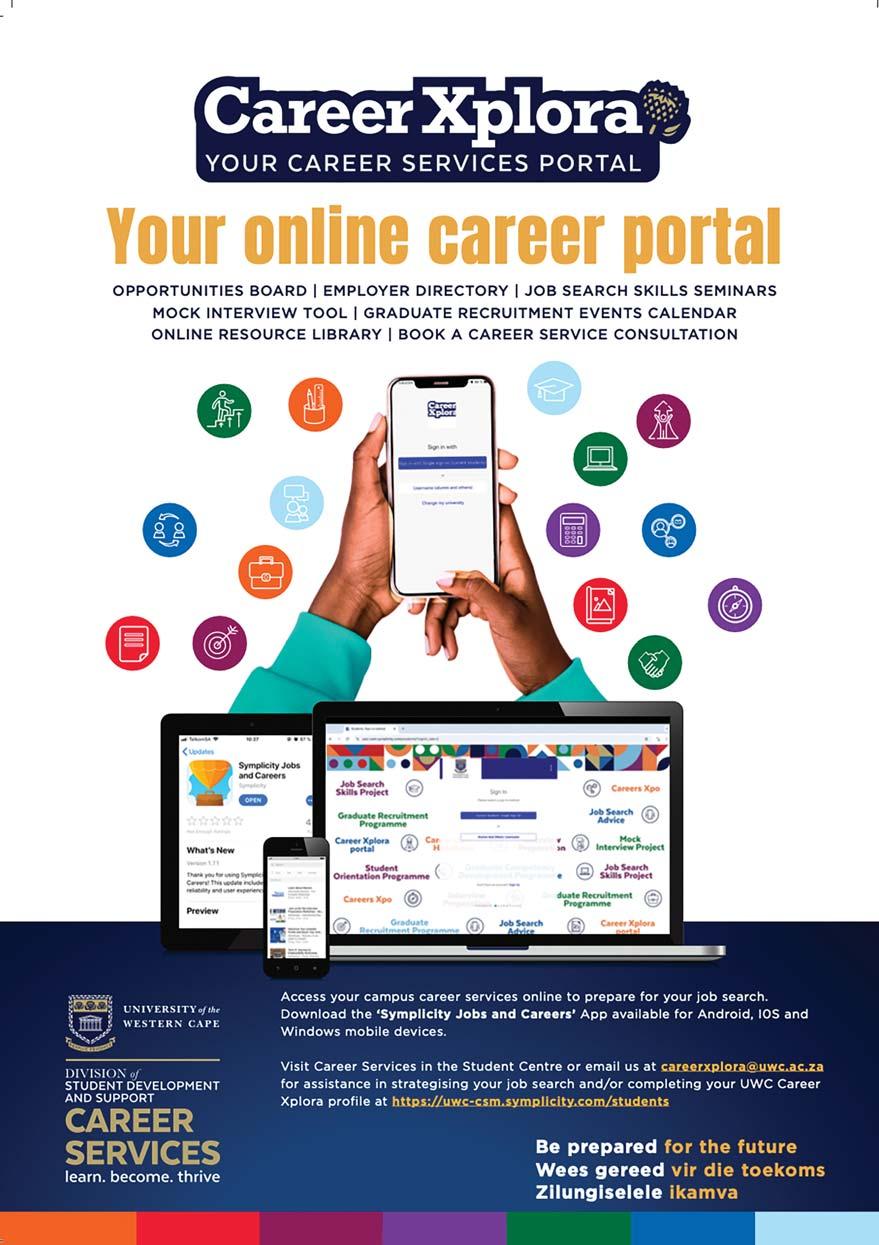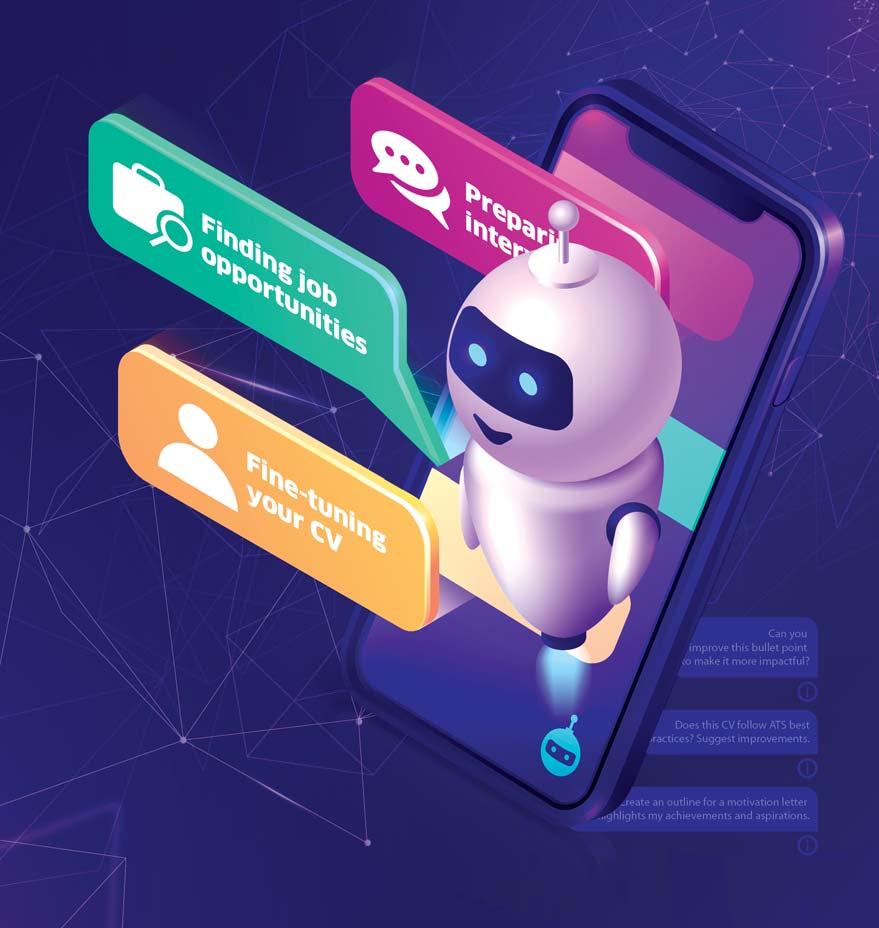










Bongane Sigauque

When


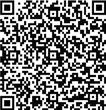

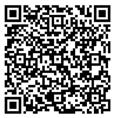
IN A WORLD WHERE THE LANDSCAPE OF WORK is constantly evolving, universities must do more than educate; they must empower.
This edition of the Career Update Handbook reflects our commitment to help you learn, become and thrive. Our role is not just to help you find your first job, but for a lifetime of meaningful contribution, adaptability and growth.
From insights shared by institutional leaders to firsthand student experiences, each piece speaks to a shared vision: transforming campus journeys into career trajectories. You’ll read about the power of student employment, the value of your hidden skills and the often-overlooked value of learning outside the classroom. There are stories of


courage, resilience and quiet excellence from students navigating both conventional and unconventional paths toward success.
Whether you are a student taking your first step into the world of work, a young graduate reflecting on your new chapter or a staff member supporting our students along their journey, may these pages remind you of your potential and the vast network cheering you on. Let this be more than a resource. Let it be a spark to discover yours.
Best Wishes UWC Career Services team

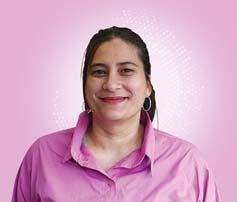


Career Update is produced by Career Services, University of the Western Cape.
Editors:
Nazrana Parker and Bridgetti Mashabane.
Contributors: Natalie Thomas, Nina Takane, Siyolise Tsitsi, Happiness Skuni, Yondela Ngqombo and Aphiwe Matiso.
Subbing, design & layout: Kult Creative.
Printing: Fingerprint Worker's Co-operative Ltd.
Thank you to all the writers and participants. Career Update, Sep 2025.
Telephone: 021 959 2436.
Email: careerxplora@uwc.ac.za
Disclaimer:
The opinions expressed in this magazine are those of the authors and writers and do not necessarily represent nor reflect the views of the University of the Western Cape. All rights reserved. Articles may only be reproduced, stored or transmitted with written permission of the copyright holder.
Campus to Career From the Rector’s Desk
Beyond the Degree Prof Matete Madiba
Your Career Starts Here Empowerment Through Connection and Preparation
Student Assistants’ Corner
Your Degree Is Just the Start: The Power of Learning by Doing Seizing Opportunities to Grow Beyond Limits
Steady, silent, solid Mihlali’s journey of purposeful support
Boost Your Employability One Work-Study Job at a Time
Wall of Fame
You Are UWC’s Greatest Ambassador
Navigating Unconventional Paths From Social Work to Operations and Finance
Not Just an Internship, a Career Launchpad
Sports as a Game Changer
Generational Differences in the Workplace Conversations That Matter
Tech-Savvy Job Search: The Role of AI
Form First Impressions
10 Tips for Acing Job Application Forms
Your Language, Your Superpower
Igniting Entrepreneurial Potential across Campus and Community
The Power of Short Courses
3 Reasons to Stay Connected with UWC
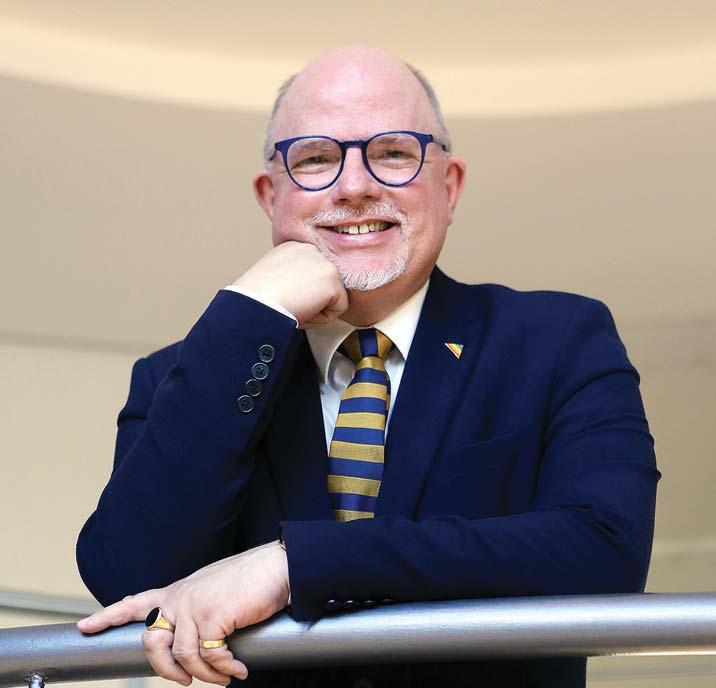
EACH YEAR, THOUSANDS OF STUDENTS GRADUATE from universities across South Africa, full of potential, but often unsure how to move from campus to career.
At UWC, we know there’s more to university life than academics alone. We aim to prepare students for a future where what you know,
what you stand for, how you adapt, and how you contribute can make all the difference. Many of our graduates overcome huge obstacles to complete their studies. Their perseverance is more than a personal achievement. In fact, it’s a source of hope for their families and communities. We believe that every graduate has the potential to
uplift others and contribute meaningfully to society. But we also know that the transition into the world of work isn’t always smooth. The gap between academic learning and labour market expectations remains a real issue. Students often tell me they feel unprepared, not because they lack ability, but because they haven’t been taught how to connect what they’ve learned to the skills employers are looking for. That’s why at UWC we’re focusing on both disciplinary knowledge and on building graduate attributes like critical thinking and ethical reasoning in a rapidly changing economy.
In my view, one of the biggest challenges is how students connect academic learning to real- world contexts. Our degree programmes provide strong theoretical foundations, but many students still struggle to turn that knowledge into practical workplace skills. Employers are looking for more than academic results. They value adaptability, teamwork, and digital literacy. These skills are often expected but not always explicitly taught. As technology continues to reshape the world of work, our curriculum must remain future-fit. That means going beyond subject content to develop our students’ ability to work across disciplines, solve problems, and engage with broader social and economic issues.
At UWC we’re focusing on both disciplinary knowledge and on building graduate attributes like critical thinking and ethical reasoning in a rapidly changing economy.
Begin by understanding your strengths, interests, and values. Start planning your future now. Don’t leave career planning for your final year. Look for learning opportunities beyond the classroom, like internships, campus jobs, volunteering, and community engagement. UWC offers many of these. Employers look beyond marks. They want to see initiative, resilience, and real-world experience. Learn to tell your story, what you studied, what you did, and what you learned from it. Build your professional network. Attend campus events, speak to lecturers, and connect with like-minded peers. And don’t underestimate the basics—like showing up, following through, and communicating well.
How can you make the most of your university years to boost your employability?
Make the most of your time at university, both inside and outside the classroom. Formal studies matter, but so do co-curricular spaces that help you grow. Join a student society. Get involved in leadership programmes. Explore interests beyond your degree. These activities build transferable skills—like communication, teamwork, and critical thinking—which are essential in any career. Stay connected to your purpose. The world needs graduates who are capable but also compassionate and committed. At UWC we are confident that every graduate can make a difference. That’s the kind of excellence we believe in—one that’s inclusive and grounded in the public good.
Prof Robert John Balfour Rector and Vice-Chancellor University of the Western Cape
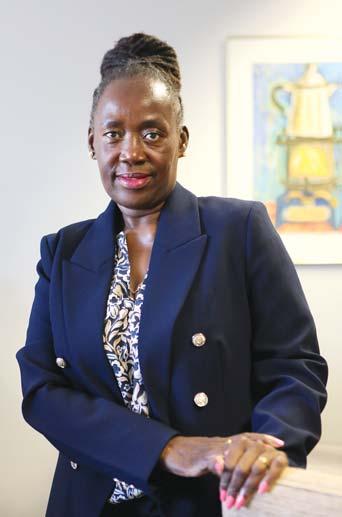
UNIVERSITIES ARE EXPECTED TO RISE to the challenge of not only educating students but by empowering them to thrive beyond graduation. The University of the Western Cape (UWC) is doing just that, with a multi-pronged approach to student preparedness, employability, and future-readiness. One of the most effective strategies for tackling graduate unemployment is the integration of work-integrated learning (WIL) and
community-based education into formal degree programmes. A standout example is the mobile dental clinic, which offers hands-on training to dentistry students while fostering partnerships with hospitals. These immersive experiences not only build technical skills but also cultivate empathy, adaptability, and civic responsibility.
UWC’s Career Services Unit is a dynamic resource centre designed to bridge the gap between education and employment.
UWC’s Career Services Unit is a dynamic resource centre designed to bridge the gap between education and employment. UWC also actively promotes entrepreneurship development. One flagship initiative is the Entrepreneurship and Empowerment in South Africa (EESA) programme. This six-week experiential learning opportunity brings together students from UWC and four U.S. universities to support emerging township entrepreneurs. These entrepreneurs—often operating informal businesses—receive consulting support, mentorship, and fresh perspectives from cross-cultural teams. It’s a powerful blend of business development, social impact, and global collaboration.
While unemployment is a pressing concern, underemployment and misemployment are equally worrisome. Underemployment occurs when individuals work in roles below their skill level, often leading to low income and poor job satisfaction. It is important to distinguish underemployment from entry-level roles, which serve as launchpads for early-career professionals.
Entry-level jobs are designed to build experience and refine competencies, paving the way for long-term career growth. Misemployment—though less widely recognised—refers to employment in roles that misalign with one’s qualifications, passions, or potential. The ideal scenario is gainful employment—where individuals find roles that match their skills, offer sustainable income, and provide personal and professional fulfilment.
For anyone facing misemployment or seeking greater alignment with their values, career pivoting offers a powerful solution. This intentional shift involves reframing your qualification as a foundation, not a limitation; exploring adjacent or emerging fields; identifying transferable skills and embracing adaptability and lifelong learning.
Career pivoting requires courage and a willingness to step outside your comfort zone. It is about reinventing and repositioning yourself, not just reacting to market demands.
Career pivoting requires courage and a willingness to step outside your comfort zone. It is about reinventing and repositioning yourself, not just reacting to market demands.
A growing concern today is the fear that AI will replace human jobs. However, recent research from MIT offers a reassuring perspective. Instead of focusing on what AI
can do, the study explored what humans will continue to do better. They identified five uniquely human capabilities—summarised in the acronym EPOCH:
Empathy and emotional intelligence
Resilience, networking, and connectedness
Opinion, judgment, and ethics
Creativity and imagination
Hope, vision, and leadership
These are not just abstract qualities—they are the very skills that employers seek. They are the essence of what makes us human, and they are irreplaceable.
To thrive in today’s evolving job market, students must go beyond the classroom and engage deeply with work-integrated and community-based learning. They must stay open to career pivots. And most importantly, they must cultivate the human-centric skills that AI cannot replicate.
Taking up leadership roles in student organisations and structures, volunteering, and interdisciplinary projects are fertile grounds for developing these capabilities. The future belongs to those who are adaptable, visionary, and deeply human.
Prepare not just for employment—but for a fulfilling career that will be purposeful and impactful.
Prof Matete Madiba Deputy Vice-Chancellor Student Development and Support University of
the Western Cape





































by Nazrana Parker
CAREER SERVICES IS DEDICATED TO GUIDING AND EMPOWERING STUDENTS as they navigate their career paths through university and beyond.
We aim to create meaningful career empowerment pathways that prepare our students for the challenges and opportunities that lie ahead in this rapidly changing world, where technology is both reshaping and creating opportunities. We'd like to remind you that whether you are a
first-year, final-year or postgraduate student; a student from any academic achievement level; a student wearing many different hats while studying, or even a recent alumnusUWC Career Services is here to support you in planning your career and navigating the job search process.
Each year, we are pleased to note that our engagement with students remains at an all-time high. This is visible through student attendance at in-person engagements, career xpos, recruitment talks or job search preparation workshops. Thank you for inspiring us to be creative in updating our online service offerings on the UWC Career Xplora portal. Look out for changes coming to the opportunities board, recruitment and workshops events calendar, more exciting new features in our multimedia resource library!
THE PORTAL HAS HELPED ME open up to the possibilities of finding nearby work for students. The App is smooth and easy to navigate through, so it helped reduce technical barriers I sometimes faced when applying for a job on other platforms.
IT HAS BEEN GOOD, not only did it help me with innovating my CV, but also helped me access more opportunities career-wise, and that made me realise how lucky we are as the University of the Western Cape students to be provided such services.
I WAS A PEER FACILITATOR for the 2025 Orientation Week. Throughout the training, one of the things that stood out to me was being educated about career services and the services they offer & I got to utilise them. Through this component, I was able to apply and get accepted for vacation work at two law firms in the past year. It also helps me save time by searching for opportunities for me.
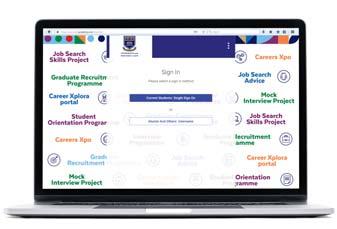
CAREER SERVICES HAS SIGNIFICANTLY ENHANCED my job search experience by providing me with personalised career guidance, expert advice, and valuable resources to help me navigate the job market with confidence. Additionally, the userfriendly platform and interactive tools have allowed me to explore various career paths, identify my strengths and weaknesses, and create a tailored strategy to achieve my career goals, making my job search more efficient and effective.
THE PORTAL HAS SIGNIFICANTLY STREAMLINED my job search experience by providing tailored job recommendations that align with my skills and career goals. Additionally, its intuitive interface and real-time updates keep me informed about the latest opportunities, making the job hunt more efficient and less time-consuming.
We have once again surpassed the 60,000 login milestone on the UWC Career Xplora in 2025, and another 5,000 new student users have logged onto the system since our last publication.
THE INFORMATION PROVIDED to me by the Career Services representatives helped a great deal in providing feedback on my CV. It was helpful as I received two internship offers shortly.
Working as a Student Assistant at Career Services has upskilled me in many facets. The first project that I assisted with was the First Year Student Orientation, where I gained valuable knowledge on project administration and insight into our beautiful campus and all the various services offered by our institution. Being a part of that experience has also taught me a great deal about mentorship and leadership skills, which has improved my capacity to lead and take responsibility.
After orientation, I immediately jumped onto the next project, which was recording a step-by-step guide on how to access and make use of the UWC Career Xplora portal in Afrikaans. This also greatly improved my vocabulary and linguistic capabilities. Following these projects, I gained valuable insight into crafting an attractive CV, from formatting to language use and layout. These skills afford me the opportunity to assist my peers who seek job opportunities. Assisting in the setup of the Career Xpo has allowed me to gain some knowledge in planning and creating successful events.
My role thus far has been a great learning experience and in many key aspects it allows me to build a portfolio of skills but also leave a small legacy at UWC.
COLE MEYERS
Working at Career Services has been both fun and educational. It opened my eyes to the many job opportunities available, not just for students in general but for me personally. I’ve especially enjoyed the fact that it allowed me to have an impact on other students' career development. I hope that through doing my best, whether it was finding the right opportunities for students to apply to or sharing valuable information, I’ve helped someone out there secure a job. This role has also taught me the importance of putting myself out there, being open to learning and embracing the opportunities that come my way. The experience has shown me just how rewarding effort and growth can be.
LETLHOGONOLO MLAMBO
Since starting at UWC Career Services as a student assistant, I've developed key attributes, such as task management and team building, to ensure that the office achieves its goals and plans successful events like the Career Xpo. During the preparation for the Career Xpo events, I learnt that strong communication skills are crucial for collaboration at work to guarantee that all plans fall into place, but at the same time, be open to learning curves. In addition, sourcing and posting opportunities on the Career Xplora platform allowed me to always be on
the lookout for bursaries, vacation work and even potential job opportunities in the future, not only for fellow students but myself. I have a broader understanding of how the Career Xplora platform works and can provide guidance to students. My experience via the Workstudy Programme granted me the opportunity to take accountability and grow in confidence.
MISCHKÉ MALGAS
So readers, there you have it! We hope that you will get those fingers moving and log onto your UWC Career Xplora at https://uwc-csm.symplicity.com/students, use your iKamva details to log in and make use of the amazing and helpful job search resources available to you 24/7/365.
Remember, UWC Career Xplora is available to you via the UWC VPN. Also, as an alumnus, you can access the portal for an additional three years after you complete your studies. If you have any job search concerns or queries about UWC Career Xplora email us at careerxplora@uwc.ac.za.
We hope that our call to “Be prepared for your Future” resonates with more students and generates agency to explore industries, learn more about current and upcoming career paths (beyond your major/ qualification), and engage with recruiters and alumni who visit campus. Being an engaged student allows you to discover that both your academic and extracurricular experiences can mould you in discovering
your sense of purpose, look for more than just a job, identify your career interest by looking at problems differently, identify gaps, upskill to meet demand and bring unique perspectives in solving the complex challenges of our time.
Now more than ever, the world requires graduates who are eager to apply knowledge faster, think critically and be curious. Due to our struggling economy, your first role may not come in the shape and form that you envision, but it will be the building block of meaningful professional learning experiences. If you have a growth mindset, remain open to learn from constructive feedback, take agency, and can adapt with technological upskilling (aka micro learning), you will succeed in shaping your future. Let us guide you on how to get started.
Provide us with feedback about the 2025 Edition of Career Update handbook and stand the chance to win a UWC Hoodie!
Email us at careerxplora@uwc.ac.za with your feedback on:
The article you enjoyed the most and why What type of content do you wish to see in future editions
Criteria: You must be a registered UWC student in 2025 and have your majors set on Career Xplora.
UWC Career Services Room 165, 1st Floor
Student Centre, UWC Access Rd Bellville, Cape Town, 7535
Email for students careerxplora@uwc.ac.za
Email for recruiters cdp@uwc.ac.za
Tel: 021 959 2436 uwccareerxplora
UWC Career Services @uwccareerservices

Continuous Learning
Volunteering
Internships
Mentoring
On-the-Job
Learning the


by Siyolise Tsitsi
UNIVERSITY PROVIDES ESSENTIAL THEORETICAL KNOWLEDGE AND ACADEMIC STRUCTURE; however, it’s the experiential knowledge and learnings beyond the traditional classroom that truly shape our readiness for the world of work.
Whether you're a current student, a recent graduate or just beginning your career, learning beyond the classroom plays a vital role in personal and professional growth. Here are a few examples of avenues through which you can gain experiential knowledge and learning:
Industries evolve, technologies change, and expectations grow. Staying informed and upskilled is key to thriving in the modern workforce, and it’s something we all have the ability to pursue.
Platforms like LinkedIn Learning, Coursera and FutureLearn have made it easier to gain new, valuable skills. For students and new professionals, this kind of learning connects and adds to your academic knowledge for the workplace demands, further showing initiative.
One of the biggest advantages of online learning is that it allows you to personalise your development based on your goals,
interests and develop your learning schedule. It also lets you build niche or emerging skills that employers are actively looking for. Beyond structured courses, continuous learning also includes staying curious, reading widely, and engaging with thought leaders through articles, podcasts, and professional forums.
Consistent self-learning demonstrates motivation and a growth mindset. It’s easy to say you’re passionate about development, but showing a track record of regular skill-building, even in a small way, sets you apart.
Volunteering is a powerful tool for personal and professional development. Whether it’s organising events, supporting local charities or mentoring younger students, these experiences strengthen skills like empathy, leadership and communication. It’s how such activities broaden our worldviews and encourage social responsibility, both of which are invaluable in today’s interconnected world.
Moreover, community engagement offers practical exposure to real-world challenges, helping to cultivate problem-solving abilities and resilience. It fosters collaboration across diverse groups, builds connections, encourages adaptability and hones a deeper appreciation for different perspectives. These experiences often spark new interests or even career paths, as they reveal passions and strengths that may not surface in a traditional classroom setting.
Among the most influential learning opportunities are internships and part-time roles. These give us a clearer picture of what different industries are like and how our studies apply in a real context. These experiences don’t need to align perfectly with your field of study, as they can help build transferable skills and reveal what interests you and what doesn’t. Internships and practical experiences often introduce us to workplace dynamics like teamwork, organisational structure and professional etiquette that are rarely taught in classrooms.
Engaging in part-time work while managing studies also teaches discipline and reinforces the importance of balance, resilience and perseverance, which builds confidence and maturity. Additionally, these experiences can provide valuable mentors and references, expanding our professional network and opening doors to future opportunities.
Mentors, whether professors, alumni or workplace supervisors, offer insights and advice that guide career decisions through sharing lessons from their journeys, which often introduce us to new opportunities. In addition, attending networking events or professional meetups gives us the chance to connect, collaborate and stay updated on industry trends.
Sometimes, a single conversation can open unexpected doors.
Learning how to present oneself, ask meaningful questions and follow up thoughtfully are crucial skills in networking.
Furthermore, being part of a professional network encourages mutual support as we also learn the value of giving back and eventually supporting others on their path. Over time, these relationships form a support system that extends well beyond formal education and into lifelong career development.
On-the-job learning often involves adapting to different work cultures, collaborating across teams, and navigating unexpected situations, all of which contribute to emotional intelligence and professional resilience. It also means learning by observing others; how seasoned colleagues solve problems, communicate under pressure, or manage conflict. These real-time examples often teach lessons that no formal training can provide.
Developing a habit of selfevaluation, taking initiative, seeking feedback, and reflecting on day-to-day work can foster accountability and a growthoriented mindset.
Travelling, exploring new interests, joining clubs, or taking on leadership roles all
contribute to personal development. It often involves developing greater self-awareness, understanding our values, motivations, and emotional responses. It’s through diverse life experiences that we start to refine our decision-making, strengthen our sense of purpose, and build meaningful relationships.
It’s through diverse life experiences that we start to refine our decisionmaking, strengthen our sense of purpose, and build meaningful relationships.
Engaging with people from different cultures or backgrounds broadens empathy and teaches us to listen with openness and humility. Beyond external activities, even introspective practices like journaling, mindfulness, or setting personal goals contribute to a deeper sense of identity and direction.
Altogether, these experiences foster lifelong habits that not only enrich our personal lives but also enhance how we engage in our communities and contribute to society.
It's clear that some of the most enriching learning happens outside formal education. Whether through work experience, online learning, mentorship, or personal exploration, these opportunities help us become more capable, confident, and adaptable.
For students, graduates, and professionals alike, learning beyond the classroom is not a bonus; it’s a necessity.
Looking to kick-start your legal career?
Webber Wentzel has got you covered! From experience programmes to candidate attorney training and associate inductions, we’ll equip you with the skills and experience to thrive in the legal world.
Articles: 2027 is currently open. Applications for 2028 will open in August 2025.
our early careers page at grads.webberwentzel.com
by Imrah Dramat

CAREER UPDATE CONNECTS WITH IMRAH DRAMAT, our former intern and administrator to share how she seized opportunities as an intern to become an integral part of the team.
Upon completing my Honours degree in Industrial/Organisational Psychology in 2021, I wanted to gain experience in higher education, student support, and career development. This led me to accept an internship at the University of the Western Cape Career Services in 2022, an ideal starting point aligned with my interests. Later, I was fortunate to be offered an Administrative and Communications Assistant position for the following two years.
In 2022 I was involved in the Virtual Student Orientation Programme. It was a new experience for me to balance logistics, marketing, and student engagement, which pushed me to grow. The return of the in-person Student Orientation Programme post-COVID19 was more exciting, requiring greater logistical management and Peer Facilitator supervision. The experience of interviewing, selecting, and supervising Peer Facilitators further deepened my leadership and mentoring skills, teaching me the importance of collaboration, adaptability, and strategic planning.
My first experience with event planning came through the annual Career Xpo, where I played an active role in assisting with the coordination of the event. I also took the initiative to liaise with alumni for the Journey to Employability Bootcamp, which is designed to connect students with alumni and industry professionals.
The experience of interviewing, selecting, and supervising Peer Facilitators further deepened my leadership and mentoring skills, teaching me the importance of collaboration, adaptability, and strategic planning.
This experience taught me the importance of time management and attention to detail. Witnessing these events come together successfully and knowing that students walked away with meaningful insights and connections was an incredibly rewarding experience.
One of my most fulfilling contributions was taking the initiative to lead and enhance Career Services’ social media engagement by recognising an opportunity to better connect with students. I collaborated to raise awareness around career opportunities and job search skills by proactively creating and curating impactful content and introducing a structured posting schedule. In addition, I ensured students had access to employment, bursaries, and co-curricular opportunities on UWC Career Xplora, helping create a more accessible and student-friendly opportunities board. Beyond digital engagement and event planning, I seized the opportunity to facilitate one-on-one consultations with students despite not
being familiar with their specific study programmes at first. Whether it was refining a CV, improving LinkedIn profiles, discussing job search strategies or providing career path advice, these interactions reinforced my passion for guiding students in their career development. A memorable consultation was with a final-year student who was struggling to compile their CV to market themselves more competitively. During our session, we worked on structuring their experiences, highlighting transferable skills and academic achievements. A few months later, they reached out to express their appreciation,
Whether it was refining a CV, improving LinkedIn profiles, discussing job search strategies or providing career path advice, these interactions reinforced my passion for guiding students in their career development.

having successfully secured a position in their desired field. Moments like this made me fully understand the real impact of the work we did at Career Services.
I also took the initiative to work closely with the student assistants to provide hands-on training in content creation and job sourcing. I found immense satisfaction in watching them develop their skills, grow in confidence, and take initiative in their roles. Mentorship was an integral part of my experience, and I take pride in knowing that I helped shape the professional growth of the students I worked with. Witnessing students take proactive steps toward their career goals was a constant source of motivation.
Facilitating job search skills workshops initially pushed me out of my comfort zone. Standing in front of a room full of students was daunting at first, but with experience, I grew to enjoy it. I developed the ability to engage students, encourage participation, and create an interactive learning environment. As part of my broader commitment to student development, I also took the initiative to deliver a presentation to high school learners, emphasising the importance of utilising campus support resources to help them navigate their academic and career journeys effectively throughout their tertiary studies.
At UWC Career Services, I gained valuable experience in content creation, event coordination, and leadership, while also developing strong communication and project management skills. Supporting diverse student needs helped shape my approach to academic coaching today. Public speaking and facilitation became core strengths, and I discovered the lasting impact
To students and aspiring professionals, I encourage you to actively seek out opportunities, build connections, and embrace every learning moment.
of mentorship—an insight that continues to guide my student-centred practice. Working in a fast-paced environment taught me resilience and sharpened my problemsolving abilities. Whether navigating tight deadlines, managing unexpected event changes, or responding to urgent student concerns, I learned to adapt quickly, think critically, and maintain professionalism. These are skills I draw on daily to ensure students receive the support they need to thrive.
As I look back, I am deeply grateful for the experiences, mentorship from senior staff, and opportunities that helped shape my professional development. The transition from student to professional was a learning curve filled with challenges, personal growth, and moments of fulfilment, all of which have significantly influenced how I approach my current role. This played a pivotal role in my growth, and I hope current and future students continue to benefit from the invaluable support the department offers.
Today, as a Facilitator and Academic Coach at the Centre for Student Support Services at UWC, I reflect on how my time at UWC Career Services provided me with invaluable experiences, skills, and insights that continue to guide me. To students and aspiring professionals, I encourage you to actively seek out opportunities, build connections, and embrace every learning moment.
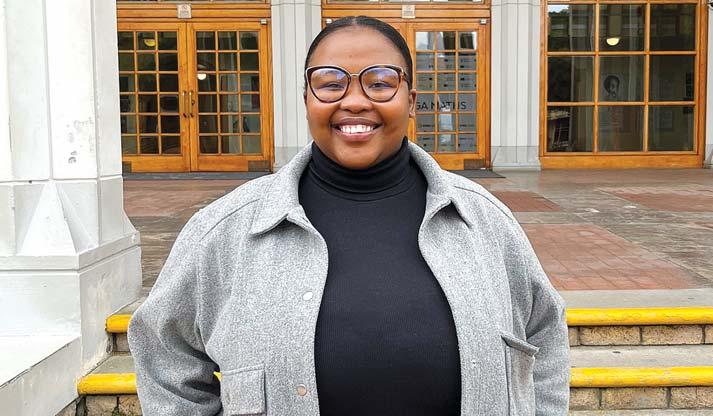


by Aphiwe Matiso
IN EVERY INSTITUTION OR SYSTEM, there are individuals whose contributions rarely seek the spotlight, yet their work touches everything. Their stories are not always loud, but they carry the weight of perseverance, purpose and a quiet transformation that yields a kind of success that is often unspoken, yet undeniable. Mihlali’s career journey is exactly that kind of story: a testament to the impact of those who lead with purpose rather than
praise and proof that you do not need to be centre stage to make a lasting difference. A story of quiet courage, steady gratification and a solid foundation was built for her career and the story has just begun.
Her pathway, from student to intern and now Administrative Officer supporting high-level operations, is not just a step-by-step progression. It is a reflection of what it means to serve with intention, grow through every challenge and find meaning in making systems work better for others.
“I’ve always been fascinated by people, how we think, work and interact, especially in the workplace,” she shares when asked what drew her to study Industrial Psychology. It is a field rooted in human behaviour,
organisational systems and the desire to create environments where people thrive. For Mihlali, that initial curiosity blossomed into a broader purpose: “Over the course of my career, I’ve realised that working behind the scenes, where processes, systems and support structures live, was where I could really make a difference.”
That desire to be part of something meaningful led her to apply for her first internship. Still a student at the time, Mihlali recognised the importance of practical experience to complement her academic knowledge. “The internship with Career Services, then the Office for Student Development, caught my attention because it felt aligned with both my studies and my personality,” she reflects. “I enjoy helping others and being part of something that uplifts. I saw it as a chance to contribute, learn, and grow in a space that I already cared about.”
I enjoy helping others and being part of something that uplifts. I saw it as a chance to contribute, learn, and grow in a space that I already cared about.
But no one could have predicted what would happen just a few months into her internship: the Covid-19 pandemic. Rather than pause her growth, it became a turning point. “My internship year was difficult, as the pandemic started when I was just three months in,” she explains. Instead of shrinking back in uncertainty, Mihlali stepped up. She facilitated virtual workshops, trained students on how to utilise the UWC Career Xplora portal, guided students on how to
improve their CVs and led parts of online sessions (SAGEA Virtual National Grad Expo), often acting as a grounding presence for others who were just as unsure about the future as she was.
“It was in those moments,” she says, “that I realised I had more to offer than I thought, that I could handle responsibility and guide others with confidence.”
Confidence, however, was not something she claimed without evidence. It was built day by day, project by project, through the kind of consistent and detail-oriented work that institutions depend on. While working in UWC’s Work-Study Department within the Financial Aid Office in 2021, Mihlali began overseeing student payroll, a mammoth task that involved administering processes for approximately 2000 student assistants.
“The scale and complexity, especially during peak cycles, helped me recognise that I had developed the resilience and skillset to take on a more key role,” she says. The highstakes nature of the task, where one small error could affect a student’s stipend, taught her the importance of precision and remaining calm under pressure.
“Being organised and paying close attention to detail have served me well… Good communication, especially when resolving queries or coordinating with stakeholders, has helped me build trust and move projects forward smoothly.” It’s a reminder that success is often built not just through big leaps, but through the steady rhythm of doing the small things well. Trust has been a recurring theme in her journey, not just in how she earns it from others but in how others have placed it in her.
She describes herself as a “true UWC product,” and with that comes a deep sense of gratitude for the mentors who helped shape her path. “Mrs Frances Jasson in the Industrial Psychology department gave me my first chance as a tutor,” she shares. She also credits Ms Lucille Teegler and Ms Nazrana Parker, who were mentors who not only created space for her to learn and grow but also held her accountable.
“Their support, honest feedback, and willingness to give me space to take ownership helped shape how I work and how I see myself professionally,” she says. “They also modelled what professional integrity and service excellence would look like, which still shapes my own work ethic and aspirations.”
Today, Mihlali is officially an Administrative Officer, though her work often overlaps with project coordination and systems support. “No two days are the same,” she says. Her responsibilities range from coordinating student assistant appointments and payroll submissions to troubleshooting data and compliance issues with HR, generating reports for planning and audit purposes and training staff on new internal systems such as WorkEase, the new UWC Work-Study portal launched in 2025. She also provides high-level administrative support to the Work Study Coordinator, balancing shortterm tasks with long-term impact.
motivates me now, knowing that the work I do makes a real difference.”
Her advice to students and interns hoping to follow a similar path? It’s simple but powerful: “Start with curiosity and humility. Be willing to learn from every experience, whether it's organising a file or leading a presentation. Deliver your work with care and don’t underestimate soft skills like empathy and communication.” And finally, she adds: “Build relationships, ask for feedback, and seize every opportunity to grow, even if it’s outside your comfort zone.”
Start with curiosity and humility. Be willing to learn from every experience, whether it's organising a file or leading a presentation. Deliver your work with care and don’t underestimate soft skills like empathy and communication.
In a world where many measure progress by titles or accolades, Mihlali reminds us that success can also be quiet, grounded and deeply impactful. Her story shows that working behind the scenes doesn’t mean being invisible.
Quite the opposite, it means being at the centre of what holds everything together.
What stands out in Mihlali’s story is how she’s redefined what leadership can look like. It doesn’t always mean having the title or leading the meeting; sometimes, it’s about creating order, clarity and fairness within the system itself. “Am I making someone’s life easier? Are we improving systems? Am I helping others grow?” she asks. “That’s what CU
For students navigating uncertain career paths, stories like these are a powerful reminder that success isn’t always instant or attention-grabbing. Often, it’s about delayed gratification, about trusting the process, doing the work and showing up with intention even when recognition doesn’t come right away. It’s built quietly, in the background, through consistency, care and character.



















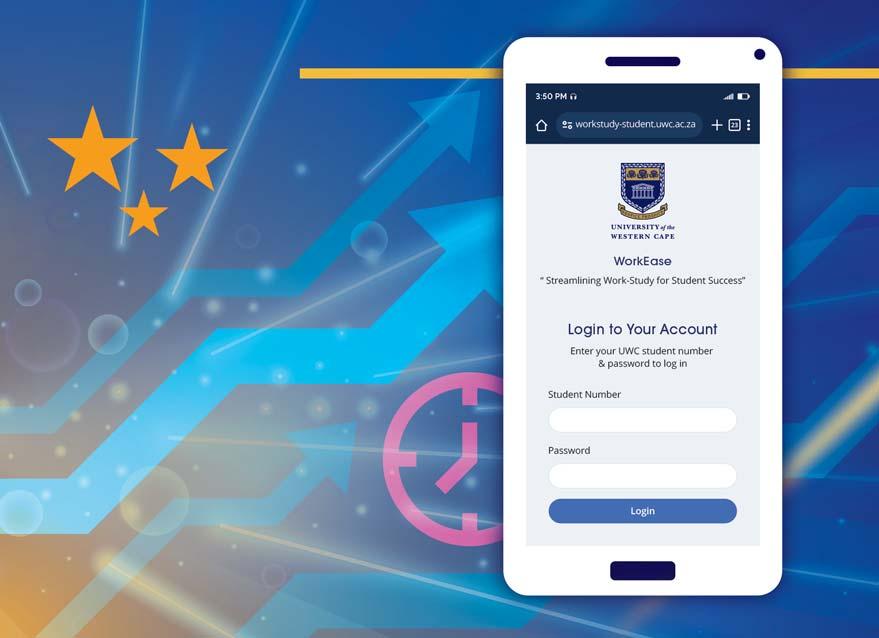


by Natalie Thomas
LOOKING TO GAIN REAL WORK EXPERIENCE, build confidence and boost your CV, all without leaving campus? The new Work-Study online portal is now live and ready for you to
explore. This platform connects you to flexible, paid on-campus opportunities that support your academic journey and employability after graduation.
Experience?
This is Your Starting Point.
If you’ve never had a job before, the Work-Study Programme is the perfect place to begin. These roles are designed to offer hands-on, entry-level experience in a supportive environment that understands the demands of student life.

The new Work-Study online portal connects you to flexible, paid on-campus opportunities that support your academic journey and employability after graduation.
From office administration and tutoring to tech assistance and event support, the work available helps you gain valuable, transferable skills such as time management, communication, problem-solving and professional etiquette. And these are exactly the skills future employers look for. “My work-study job gave me the confidence to speak professionally, manage deadlines and work with different people,” says one past student assistant. “I wouldn’t have landed my internship without it.”
Another student stated, “I didn’t think I had anything to put on my CV until I joined the Work-Study Programme. My role in the faculty office taught me how to manage time, handle responsibilities and communicate professionally. It gave me a sense of purpose, and now I feel more prepared to enter the world of work.”
The introduction of the online portal also reflects a broader commitment to efficiency, transparency and accountability in how student employment is managed. The system has been two years in the making, with extensive behind-the-scenes collaboration between administrative teams and the UWC Project Management Office.
“It was exciting and intense,” the Coordinator shares. “We worked through every detail of the system and ensured it works for students. We’re proud of the result.”
Here’s why thousands of students grab Work-Study opportunities and why you should, too:
REAL-WORLD EXPERIENCE: Apply your studies in a workplace setting and learn new, sought-after skills.
FLEXIBLE WORKING HOURS: Designed to fit around your class timetable and academic priorities.
INCOME WITH PURPOSE:
Earn money while building your professional foundation.
CV SUPPORT: Get a strong referee and grow your confidence in professional environments.
NETWORKING: Build connections with university staff and gain insight into many other fields of interest.
These are the kinds of opportunities that help you stand out when applying for internships, bursaries, graduate jobs or postgraduate study.
Gone are the days of pinning your hopes on noticeboards, waiting for emails or dropping off your CV at department helpdesks. With just a few clicks, you can now log into the portal, view available job listings across faculties and support units, apply and track the status of your application, all in one place.
This is more than just an upgrade. It’s a shift in how the university supports student growth, academic, professional and personal. It puts you in control of your career development journey while you’re still studying. You decide what roles interest you.
Whether you’re looking to save for the semester or simply take that first step into the working world, the WorkStudy Programme is here for you.
Whether you’re looking to save for the semester or simply take that first step into the working world, the Work-Study Programme is here for you.
Enter your UWC student number & password to log in
Getting started is easy.
LOG IN to the Work-Study portal using your student credentialshttps://workstudy-student.uwc.ac.za/
BROWSE available positions under ‘Vacant Posts’. Apply for the ones that align with your interests, studies and availability.
The launch of the Work-Study Programme’s online portal marks a major leap forward, not only in how we manage student jobs but in how we invest in our students’ futures. With this platform, gaining meaningful work experience on campus has never been more accessible, transparent, or empowering. It puts the opportunity right at your fingertips, it’s a tool designed to support your growth, develop your confidence and help you take that first step into the world of work.
Start exploring. Start applying. Start building your future today.































In a world often fixated on numbers, it’s easy to overlook the profound impact accountants make beyond the spreadsheets.
Accounting isn’t just about balancing books or leveraging numbers; it’s also about balancing purpose and passion. Choosing a career in accounting and finance can pave the way for you to pursue your passions while making a real difference in the world. Be a catalyst for change, inspire meaningful social action and join a community of difference-makers today.
SAICA, the South African Institute of Chartered Accountants, empowers young professionals to find purpose in their careers, driving positive change in business, communities, and beyond. Find out how to become a difference maker https://www.accountancysa.org.za/youth-hub/
#LevelUpWithSAICA. SAICA’s got the plug for levelling up your life www.saica.org.za we see your story of making a difference.










but not sure how you’re going to pay for your university studies?
Sitholile Sithole SAICA Trainee and Thuthuka beneficiary


Let Thuthuka inspire you to success







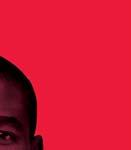
What is Thuthuka?






















Every year, the South African Institute of Chartered Accountants’ (SAICA’s) Thuthuka Bursary funds African and Coloured students at selected SAICA-accredited universities in fully funded and supported undergraduate BCom Accounting, PGDA and CA stream programmes to help them reach their dream of becoming a Chartered Accountant [CA(SA)].
Thuthuka is a bursary like no other. Covering more than just your tuition, books, meals and accommodation, Thuthuka also offers additional psycho-social and academic support to assist you in bridging the gap between high school, university and the world of work. Thuthuka provides the support system that enables you to succeed and realise your dream of becoming a CA(SA). So, if you’re an African or Coloured Grade 12 learner who is achieving a level 5 pass in Maths (not Maths Literacy) or a university student studying a CA-stream undergraduate BCom Accounting or PGDA programme and you need financial assistance, Thuthuka is a solution for you. To find out more about the Thuthuka Education Upliftment Fund (TEUF), go to the SAICA website www.saica.org.za/initiatives/thuthuka
To apply for the Thuthuka bursary, visit www.thuthukabursaryfund.co.za/
Take note that Thuthuka applications open every year in March and close in August.
#LevelUpWithSAICA. SAICA’s got the plug for levelling up your life. www.saica.org.za
What sets them apart?
CAREER UPDATE shares stories of graduates who have landed their first job. We tracked them to find out what they did during their job search and share the remarkable efforts that gave them an edge over their peers.


What set me apart during my job search was my commitment to continuous growth and intentional involvement in opportunities beyond the classroom. As Chairperson of the ABASA UWC Student Chapter, I developed leadership and project management skills while expanding my professional network through meaningful engagements with industry leaders. This experience boosted my self-confidence and taught me how to communicate with impact, skills I carried into interviews and professional spaces. I also volunteered with Fun Learning for Youth, tutoring mathematics to high school learners. This experience gave me purpose and strengthened my ability to explain complex concepts clearly, an essential skill in finance roles.
In preparation for entering the job market, I went beyond submitting CVs. I actively built my professional brand on platforms like LinkedIn, reached out to professionals for guidance and attended virtual industry events. Before interviews, I researched companies in detail, aligned my strengths to their values and practised consistently with mentors. These proactive steps allowed me to position myself as a well rounded candidate who brings both technical expertise and a passion for making a difference.








Master of Development Studies, 2025 Research Consultant, Synergy Consulting
What really set me apart wasn’t one big thing; it was the small, consistent steps I took during my time at UWC to build my portfolio. I stayed active on campus. I mentored, tutored, worked as a student and research assistant. Being visible and involved helped me build connections and this network opened opportunities. During vacations I made sure to always have something lined up, whether that was working at Studio 88 and Mr Price - taking advantage of every opportunity.
After my studies I was accepted into the Presidential Youth Stimulus Employment Programme at UWC, where I worked at the Faculty of Arts and Humanities then joined UWC Student Credit Management as a Consultant. These experiences gave me insight into the world of work.

During all of these experiences, I stayed active on LinkedIn connecting with professionals, following companies I admired and making sure I understood what different industries were looking for. I also attended campus career workshops to learn from employers. All these efforts gave me a strong foundation and confidence when completing applications. I had real life experiences to share in interviews, not just theory. My advice to fellow students is simple: start early, be proactive and don’t underestimate the power of small steps. Build your career one campus opportunity at a time.


AT UWC, YOU ARE MORE THAN JUST A STUDENT, you are a vital representative of an institution with a rich history of social justice, academic excellence and community impact.
Whether you realise it or not, your actions, achievements and engagement shape how the world perceives UWC. Here’s why you should embrace your role as an ambassador and why you already are one. You are a brand ambassador with the power to shape perceptions, attract future students and strengthen UWC’s reputation.
Here’s how you can actively promote UWC while creating meaningful awareness as a student
1. You Represent UWC’s Legacy of Resilience and Transformation
UWC was founded during apartheid as a "university for the disadvantaged," yet it


by Nina Takane
defied oppression to become a beacon of academic excellence, activism and social change. Your presence as a student continues UWC’s tradition of breaking barriers. Every time you excel academically or contribute to campus life, you honour the struggles of those who built this institution.
Alumni like Prof. Jakes Gerwel, Prof. Brian O’Connell, Prof. Jonathan Jansen and Dr. Diana Ferrus and many others prove that UWC produces world-changers, and you’re next. By simply being here, you carry forward UWC’s mission.
As a UWC student, you serve as a vital link between the university and the broader society, carrying its mission beyond campus borders. Every conversation about your UWC experience, whether with family, friends or former teachers, becomes an opportunity to showcase the university’s impact. When you share stories of academic growth, campus diversity or community projects with your high school mentors or local leaders, you’re not just reminiscing; you’re actively shaping perceptions and inspiring future applicants. Your authentic voice holds more weight by simply speaking proudly about your UWC journey at community gatherings, youth programmes or even on social platforms, you become its most relatable ambassador.
This grassroots promotion matters; it puts UWC on the radar of prospective students who might not otherwise consider it, while reinforcing the university’s relevance to local stakeholders. Your everyday interactions, infused with genuine enthusiasm, help demystify higher education and position UWC as an institution that transforms both individuals and communities.
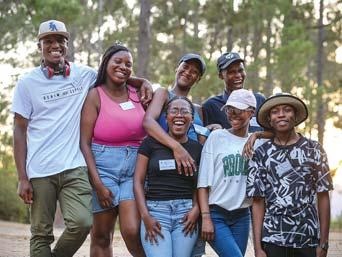
The heartbeat of any university lies in its student community, and at UWC, you are the driving force behind campus vibrancy and institutional identity. Through your involvement in student societies, sports teams, Student leadership, cultural events and academic forums, you actively craft the lived experience of what it means to be a UWC student. Your choices, whether joining the debate society, volunteering with the Green Campus initiative or participating in the Creative Arts Choir, contribute to a dynamic campus culture that future students will inherit.
The heartbeat of any university lies in its student community, and at UWC, you are the driving force behind campus vibrancy and institutional identity.
Beyond participation, your leadership in student organisations and initiatives creates a lasting impact. Mentoring first-year students fosters a culture of support and inclusivity, while championing causes like gender equality and mental health awareness drives meaningful change. Even your digital presence on social media posts amplifies UWC’s spirit to prospective students and the broader community.
The energy, ideas and values you bring to campus today don’t just enrich your journey; they set the tone for generations of UWC students to come. By embracing this role, you ensure that UWC remains a place where innovation, diversity and student-led transformation thrive.
UWC isn’t just an institution, it’s a lifelong community. As an ambassador, you help maintain and grow this network. Your connection to UWC extends far beyond the classroom. You become part of an enduring global community that thrives on mutual support and shared purpose. As a student ambassador, you lay the foundation for lifelong professional and personal networks that span continents and generations. The relationships you cultivate today with classmates, professors and visiting speakers evolve into tomorrow's collaborations, mentorships and opportunities. By actively participating in alumni events, co-curricular activities and UWC digital platforms, you help sustain the unique UWC ethos that binds this community together.
Your engagement creates ripple effects, whether by connecting a recent peer to an opportunity on campus, facilitating research partnerships between alumni, or simply maintaining the traditions that make UWC distinctive. This living network becomes increasingly valuable over time, offering not just career advantages but enduring friendships and a shared commitment to UWC's mission. Every interaction, from casual campus conversations to formal networking events, contributes to weaving this resilient web of connections that will support you and fellow UWC community members throughout your lives. The strength of this community depends on ambassadors like you who recognise that their UWC story doesn't end at registrations or graduation. It's merely the first chapter in a lifelong relationship with an everexpanding family of changemakers.
Check out 2024 Career Update Handbook article “A step-by-step guide on crafting the perfect LinkedIn profile”.
The world is watching and it needs what UWC stands for. As a student, you're not just a passive learner but an active carrier of UWC's transformative values. Every day presents opportunities to be UWC's most powerful advertisement, simply by how you choose to show up in the world. When you approach differences with curiosity rather than judgment, you demonstrate UWC's commitment to understanding. When you challenge injustice in your classroom or community, you embody our tradition of courageous leadership. The way you collaborate across cultures, advocate for sustainability or support younger students; these aren't just personal actions, they're living proof of UWC's mission in action.
Your greatest power as an ambassador lies in making these values visible. Share stories of intercultural friendships that changed your perspective. Highlight professors who embody UWC's spirit of mentorship. Post about campus initiatives tackling real-world problems. These authentic experiences do more to attract future students than any brochure ever could.
Remember that people will never forget how you made them feel about what UWC represents. Will you be the kind of ambassador that makes others say, "I want to be part of that"? The world doesn't just need to hear about UWC values – it needs to see them alive in you.
You chose UWC because you embody its values. Every lecture you attend, every project you lead and every person you inspire reinforces why this institution matters.
UWC Ambassadors are catalysts for change and influencers of aspiration. They are tasked with painting a picture of what is possible, highlighting the university's academic excellence, its supportive learning environment and its commitment to social justice.
They speak about:
• Student support services that help individuals thrive academically, emotionally and socially.
• Quality residential services that ensure comfort, safety and a sense of belonging.
• A beautiful, inclusive campus environment where diversity is not only celebrated but embedded in institutional culture.
• A legacy of leadership and impact rooted in UWC’s history of transformation and social responsibility.
Wear your UWC colours with pride, whether at conferences, online or in your community.
Share your story about why you chose UWC over other universities or speak about your UWC journey. Mention UWC in LinkedIn posts.
Give back by mentoring, volunteering, or supporting UWC initiatives.
Live the mission by carrying UWC’s values into your future endeavours.
YOU ARE UWC’S GREATEST AMBASSADOR!
The Value of the Student Ambassador
Being a student ambassador is not just a title; it is a responsibility. It is a position of influence and service. Ambassadors give meaning to the lived UWC experience by sharing it with others, demystifying the application process, explaining funding and scholarship opportunities and most importantly, inspiring hope in those who may not see university as a possibility.
UWC’s Ambassadors are walking narratives of resilience, excellence and community. They are the bridge between the institution and the world, ensuring that the UWC voice is not just heard but felt across the country and beyond.
Dr Laurence Corner Director Student Enrollment and Management Unit CU

Your postgraduate journey starts here
Choosing to pursue a postgraduate degree is a significant decision
We recognise that this choice involves a considerable investment of time, effort and financial resources. It’s a step that should be carefully considered, with a clear motivation in mind.
For many students, advancing their knowledge in a specialised field serves as the primary reason for pursuing postgraduate education. In certain industries, postgraduate qualifications have become essential due to evolving professional standards. While a bachelor's degree was once the primary entry requirement, honours and master's degrees are increasingly considered the new benchmark for career advancement.
Career transitions also drive many individuals toward postgraduate studies. Whether you are contemplating a shift to a new profession or seeking to expand your expertise in your current field, a postgraduate
qualification can provide the necessary skills and credentials. Specialised programmes, such as a one-year postgraduate diploma or certificate, can further support your professional growth by offering targeted knowledge and practical experience.
The University of the Western Cape (UWC) is renowned for its research excellence, high academic standards and global rankings, all supported by a vibrant and inclusive university community. Research is fundamental to advancing human knowledge and addressing society's most pressing challenges. At UWC, we are committed to finding solutions through innovative and impactful research.
Pursuing postgraduate studies at UWC will set you apart by providing exceptional academic support, professional development opportunities and access to world-class resources. Join us in shaping the future through research and discovery.


by Bridgetti Mashabane
CAREER UPDATE (CU) caught up with Dr Mufaro Dean Magidi, a UWC alumnus who successfully transitioned from a career in Social Work to roles in Operations and Finance.
Tell us a bit about yourself and what you studied here at UWC.
I’m originally from Zimbabwe and moved to Cape Town in 2008 to begin my undergraduate studies in Social Work at UWC. My academic curiosity and interest in the values and purpose of social work, such as a commitment to social justice and advocacy, led me to continue my academic journey. Ultimately, I completed a Master’s degree and a PhD in Social Work by 2022.
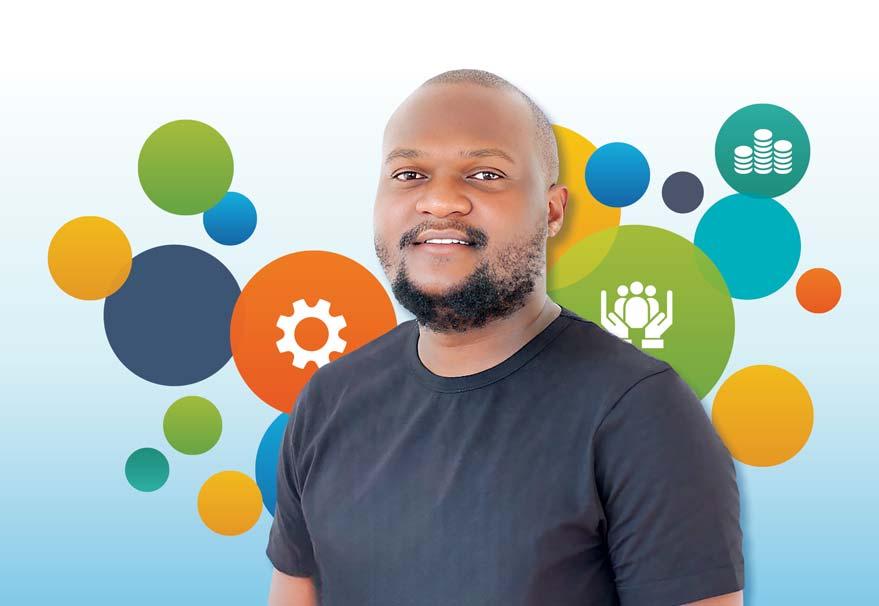
What initially inspired you to pursue social work, and what kept you motivated to go all the way to your doctoral studies?
My journey into Social Work wasn’t my initial plan; it became a meaningful and deliberate path after some time. Someone close to me suggested I consider Social Work. Around that time, Zimbabwe was going through a period of significant social and political instability, which led to a surge in civil society activity both within the country and in neighbouring regions. I witnessed firsthand how communities were mobilising, how NGOs and grassroots organisations were stepping in, and the need for people who could offer practical support. This context made social work feel like more than just a degree; it felt like a response to a moment. So, when I joined UWC, I did so by equipping myself to be part of that response.
Don’t limit your degree to one career path, explore how your skills can be applied across different industries.
The thing that kept me going all the way through to my doctoral studies was the grounding belief that Social Work is both a tool for individual transformation and a means of challenging systemic injustice. Few in-between academic degrees offer the same insight. The other motivator was the passion and the growing realisation that, at each stage of my studies, I was not only building technical knowledge. I was also deepening my understanding of the profession’s potential to expand beyond the traditional Social Work that many people have become accustomed to.
You made a move into Operations and Finance, which many people wouldn’t expect after a career in Social Work. How did that come about, and what steps did you take for this transition to happen?
I attribute the shift to a colleague whom I still hold dear, Riaan Goosen, whom I worked with while I was practising as a Social Worker. While I was observing and learning from Riaan, who is a seasoned Finance and Operations Director in the NGO space, I realised that behind the impactful social justice initiatives we were implementing, there was an engine, a set of systems, processes and financial structures working behind the scenes to make the work sustainable. I found myself increasingly curious about how those systems work.
In my curiosity, I leaned in and took on small operational tasks such as logistics, budgeting for programmes, or helping to refine internal processes. These tasks gave me practical insight into how operations and finance intersect with programmatic work. I then sought out mentors and upskilled by taking short courses to strengthen technical knowledge, particularly budgeting, compliance and project management. As I gained more experience, I was entrusted with greater responsibility, including managing budgets, overseeing donor reporting and streamlining internal systems. Over time, it became clear that my career path didn’t have to be linear and that my skill set could bridge the gap between traditional social work and the backbone that supports it. That’s how the transition happened. I must add that the transition was not a departure from Social Work, but an extension of it, from a different vantage point. I now embrace the non-linearity of my career as a strength.
Were there any specific challenges you faced when making this change, and how did you overcome them?
Yes, one of the biggest challenges was building credibility in a space where I didn’t have a formal finance and operations background. I often felt like I had to prove myself, not only to others, but to myself. To overcome that, I committed to continuous learning. I asked questions, even when I felt uncomfortable doing so, and sought out mentors who were patient and generous with their knowledge.
Another challenge was shifting my mindset. Coming from a Social Work background, my instinct was always to lead with empathy and prioritise people. In Operations and Finance, I had to learn how to balance that empathy with structure, accountability and resource stewardship. It was a growth curve, but over time, I learned that the two approaches don’t have to be in conflict; in fact, they can complement each other when managed intentionally.
Lastly, to this day one challenge I still battle with is navigating imposter syndrome. Being in a professional space, surrounded by people with formal finance qualifications, can be intimidating at times. Grounding myself in purpose serves as a reminder that strengthens the foundation of the work I believe in.
Instead of asking “what job can I do with my degree?”, ask “where can my skills make the most impact?”
Many people don’t realise how transferable their skills are; what skills from your background in Social Work do you find yourself using in Operations & Finance today?
That’s so true! Many people underestimate how transferable their skills are. My background in Social Work has been one of my greatest assets. For one, systems thinking is central to both fields. In Social Work, you’re trained to look at the bigger picture, to see how individuals, structures and environments interact. That same ability to analyse systems holistically helps me promote operational processes that are not only efficient but also people-centred.
Empathy and communication are also key. In Operations and Finance, you're often translating complex information for different audiences, such as staff, donors, board members and communities we serve. My Social Work training taught me how to listen, distil information and communicate with clarity and compassion, which makes collaboration across teams much smoother. In Operations and Finance, it's easy to get caught up in numbers, compliance matters and targets. My background constantly reminds me to ask, ‘Who is impacted by this decision? Is it ethical? Is it equitable?’
Another important skill is problem-solving in high-pressure environments. Social Work exposed me to complex, emotionally charged situations, which taught me how to remain grounded, manage risk and make sound decisions, all of which are critical in Operations and Finance.
Therefore, I think that my background gives me an edge. Even as I draw budgets, I don’t
just see a budget line, I see the people and programmes behind it. That awareness influences how I prioritise spending, how I approach risk and how I advocate for resourcing decisions that are both financially sound and socially just.
What do you love most about the work you're doing now in Operations and Finance?
There’s something incredibly fulfilling about knowing that the systems I help build, directly support the people and programmes that are creating real social impact - whether it's a budgeting process, a policy or a reporting structure. I also love the problemsolving aspect. Every day brings a different challenge, it keeps me thinking creatively and strategically. I enjoy being the person who can connect the dots between vision and implementation.
Many students struggle to see how their degrees could apply outside of the traditional paths. What advice would you give to them?
Do not box your degree into one career path. Your studies have given you more than just subject knowledge; they have equipped you with transferable skills like critical thinking, communication, problem-solving and adaptability. Those skills are incredibly valuable across sectors. The world of work is constantly evolving and so are the ways we build careers. Be open to exploring areas that spark your curiosity, even if they seem unrelated to your degree at first glance. Sometimes the most fulfilling careers are built at the intersection of what you studied, what you’re passionate about and what your community or country needs at the time.
At UWC, you're not just earning a qualification, you also have the opportunity to gain practical experience through work-study programmes and co-curricular activities. These are designed to help you build real-world skills, grow your confidence and apply your learning in meaningful ways beyond the classroom. Whether it’s taking part in leadership programmes, volunteering, joining societies or working in departments, these experiences are powerful tools to help shape your personal and professional journey. Stay open. Be curious. Let your purpose guide you.
If you could go back and speak to your final-year self at UWC, what career advice would you give?
I have been thinking a lot about this, reflecting on missed opportunities and moments that were not fully realised because of who I was at this time, and so I would say to myself…
“Trust that your path doesn’t have to look like anyone else’s. You don’t have to have it all figured out right now. Stay open, stay curious, and don’t be afraid to follow the things that spark your interest, even if they don’t ‘fit’ the degree you’re graduating with.
I’d also remind myself that every experience counts, even the ones that feel small or uncertain at the time. The skills, values and resilience you're building will carry you further than you think.”
Treat every co-curricular activity, work-study opportunity or leadership opportunity as a stepping stone in shaping your career journey. CU

At Absa, your story is integral to our shared adventure, defining who we are and guiding our collective future. We embrace you for who you are and support you as you grow into your full potential. Each individual’s unique contribution helps shape our identity. Together, we cultivate a workplace where you feel valued, nurtured, and respected—a place where your story is celebrated, encouraging true belonging and inclusion.
As Africa’s leading digitally-driven bank, we’re committed to success. Our achievements are driven by empowering each team member to learn, grow, and innovate, contributing to our collective narrative of excellence—an excellence built on the diverse stories of our colleagues.
Stories hold immense power. They foster understanding, inspire, motivate, bridge gaps, and transcend barriers, deepening our connections and sense of belonging. Through stories, we have the power to shape our future together.
@Absa your story Matters



by Happiness Skuni
CAREER UPDATE (CU) CAUGHT UP WITH SANGIWE PHATHISA NTSHANGANA, UWC alumna and former Graduate Competency Development Programme (GCDP) intern. What began as an opportunity to gain experience soon turned into something much bigger.
Through the GCDP, Sangiwe went from completing internship hours to travelling with UWC student-athletes to the University Sport South Africa (USSA) National Tournaments not as a participant, but as a
leader, organiser and administrator. Today, she works full-time at the UWC Sport Administration, mentoring students and managing national-level travel. Her journey is a clear example that internships can be more than just stepping stones; they can launch lasting, impactful careers.
What motivated you to apply for the GCDP?
After completing my postgraduate studies, I faced the harsh reality of unemployment. I was actively job-hunting, using Career Xplora to search for opportunities and came across the GCDP listing. It stood out because I met the requirements. I wanted to use the opportunity as a way to gain work experience because at that time, I did not think much of internships. I later realised it had much more to offer.
Can you describe your expectations before joining the internship? Did they match reality?
I thought internships were only about gaining experience to help you apply for jobs. When my application was successful, I had minimal expectations. After the one-month virtual orientation, we were placed in various Student Development and Support (SDS) departments. I was placed in the UWC Sport Administration, and from that moment, my journey changed. I figured I’d do administrative work, sit in some meetings, maybe get a reference at the end. Instead, I got mentorship, leadership training, soft skills and opportunities that challenged and shaped me. The programme gave me confidence and real responsibilities. I didn’t expect it, but I’m so grateful for it.
What were some of the key projects or responsibilities you handled during the internship?
I’ll never forget the day my manager asked me, “What do you want out of this internship?”. I said I wanted to gain experience and was open to learning. He assigned me to manage netball, dance sport and work-study, three very different projects. At that time, I did not have experience in managing sporting codes and overseeing student assistants. I had to coordinate with coaches, communicate with student-athletes and run full-year programmes. It was a major leap and it taught me to lead, adapt and take ownership.
How did your experience during the GCDP internship help shape your career mindset and reveal your strengths or interests?
Absolutely. The GCDP internship was a turning point in shaping my career mindset. I learned how to communicate professionally, both via email and in person, and developed key administrative skills like minute-taking, managing schedules and sending calendar invites. These foundational tasks taught me how important the “small things” are in keeping a professional environment running smoothly. They also helped me build critical soft skills like time management, problemsolving and the ability to think ahead.
Before the internship, I knew I was academically strong, but I had never really worked in teams or led projects. Through the programme, I discovered that I could lead, mediate conflict, contribute ideas and collaborate effectively. It helped me realise how much I enjoyed engaging with people, supporting students and being part of something bigger than myself. It also sparked a new interest in sports management, beyond just being a football fan, which opened up a whole new career path I hadn’t considered before.
Were there moments during the internship that inspired you?
One of the biggest moments came when I was asked to manage the UWC Netball team at the USSA Games. It was overwhelming. But we made it work. The proudest moment was when our team won the tournament. That experience proved to me that I can rise above the pressure, lead with purpose and execute a plan even when I feel unprepared.
What responsibilities do you take on during these trips in the USSA, logistically and in terms of supporting the students?
I had no experience with university sports tournaments, and I only had two months to plan everything. Now, planning is my world. I manage transport, accommodation, equipment, medical supplies and team support for USSA trips. I also work with student-athletes beyond sport, helping them with academics, bursaries and adjusting to university life. Throughout the year, I handle event management, budgets, sponsorship proposals and make sure everything aligns with university safety and compliance protocols.
What were some of the biggest transitions or adjustments moving from intern to staff member?
The biggest shift was internal: I had to change my mindset. As a staff member, I needed to be more accountable, report formally and take initiative. I became someone others looked up to, especially the new interns. It was a move from student to professional, from learning to leading.
How has your journey from intern to administrator shaped your long-term career vision?
When I started, I wasn’t sure what I wanted long-term. I was in limbo, like many students. The internship helped me realise I don’t need to have it all figured out, but I do need a start. It gave me space to explore, fail, try again and build clarity. Now I know I want to stay in the university space, and maybe one day manage a professional football team, combining my passion with purpose.
What advice would you give to students about seizing internship opportunities even if they seem small at first?
Take the opportunity. Show up. Learn. Internships give you a foot in the door. Whether big or small, they can build the foundation for your career. For me, it was a life-changing chance, and it could be for someone else too. I could not emphasise this enough about internships, especially since I am where I am because of one.
What would you say to institutions or employers about investing in structured internship-to-employment pathways?
Internships should be a strategic priority. They’re not just about training; they are about transformation. Programmes like these give real, measurable support to students transitioning into the professional world. And for institutions, they create a pipeline of skilled, aligned talent who understand your systems and values.
Seeing students compete at USSA always fills me with pride. Win or lose, they represent UWC with passion and resilience. Watching them push their limits and support each other reminds me why I do what I do. Sometimes I feel like a proud parent, even though I’m not that much older than they are. Their growth is my reward.
Finally, what’s next for you? Are there goals you're now aiming for because of this experience?
I want to continue working in university sports and grow within the USSA structure. I’m also passionate about football and dream of managing a professional team one day and I aim to pursue my Master’s degree soon. I’m taking it one step at a time with more confidence than ever before because this programme showed me what I’m capable of. CU
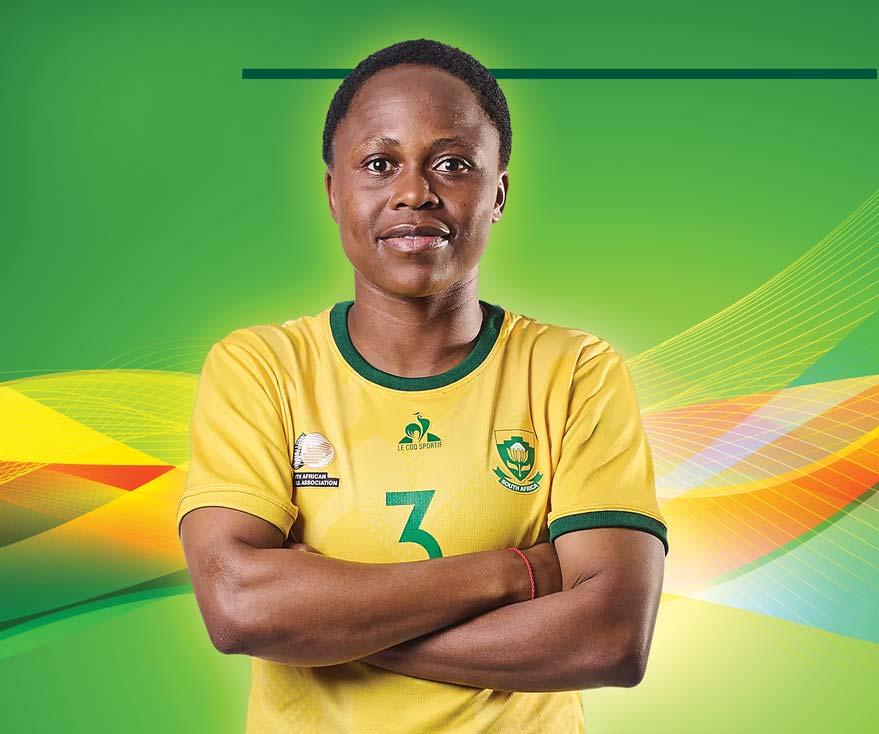
FOR MANY YOUNG WOMEN IN SOUTH AFRICA, the path to professional sports is filled with obstacles. Limited access to quality training facilities, scarce financial resources and deeply rooted gender stereotypes continue to block the progress of talented female athletes. Women in sport still face systemic challenges, from unequal pay and media coverage to a lack of institutional support and recognition.


by Yondela Ngqombo
These barriers often make it difficult for aspiring sports women to dream beyond their immediate environment. For studentathletes, the challenge is even greater. Balancing demanding academic schedules with intense training, travel and competition can take both a mental and physical toll. The pressure to perform in class while also excelling on the field requires resilience, time management and a strong support system.
One such story is that of Bongeka Gamede, a UWC alumnus whose journey from the rural town of Ixopo, KwaZulu-Natal, to the global football stage is a shining example of how sports can be a game changer.
Bongeka discovered her love for soccer while playing alongside her three brothers. Growing up in a rural area posed many challenges, but it also gave her the drive to dream bigger. Inspired by a fellow KZN-born player, Amanda Dlamini, Bongeka aspired to reach similar heights in the world of soccer. “I wanted to be in the same space as her, playing at her level”, she recalls.

Her journey took a significant turn when she was accepted into the High-Performance Centre (HPC) in Pretoria, where she trained and developed for five years. "That was a blessing for me," she says, as it helped her become the player she is today. This opportunity exposed her to professionallevel competition and laid the foundation for her rise as a defender with a commanding presence on the field.
In 2018, Bongeka enrolled at the University of the Western Cape (UWC) to pursue a Bachelor of Arts degree in Tourism and to continue with her soccer career. Playing for UWC moved her closer to her dreams, she was not only a player for the first team of the UWC Women’s soccer but also the vicecaptain. "I grew a lot as a player and I learned that there are different types of leaders in football," she says.
Balancing sports and studies was no easy task, especially with the pressures of academic deadlines and national team call-ups. "It was hard, but we had our support team who ensured we kept up with schoolwork," she explains. The UWC Sports Administration communicated with faculties when they had away games and provided them with an academic coach who made sure that they met their deadlines and asked for assistance when they needed.
The pressure to perform in class while also excelling on the field requires resilience, time management and a strong support system.

Her story is not just about medals and titles, it is about perseverance.
Her ability to juggle academics and sports shows how disciplined and determined she was. It was at UWC where she received her first call-up to the national team to represent South Africa in a friendly against Norway where she made her international debut, in 2019. Her commitment to excellence showed both on and off the pitch.
In 2023, she faced a tough challenge playing in the FIFA Women’s World Cup during her final exams; however her resilience and determination got her to be named UWC’s Sportswoman of the Year. The following year, she helped UWC make history by winning the 2024 COSAFA CAF Tournament in Malawi, a first for a university team.
While her international career began in the junior ranks, representing South Africa’s Under-17 and Under-20, she made her senior debut in 2019. Despite never having played a
senior match before, she was selected for the squad travelling to the FIFA Women’s World Cup in France. One of her most remarkable achievements came in 2022 when she was part of the Banyana Banyana team that claimed their first-ever Women's Africa Cup of Nations (WAFCON) title. This was a historic victory that highlighted the rise of South African women’s football and Bongeka was a part of that success.
With a dream to also play for a European team, Bongeka and her agent searched for opportunities to help bring her dream to reality. In November 2024, a deal was confirmed for her to play for FC Nordsjælland in Denmark.
Today, she is living her dream proving that hard work and dedication can lead to amazing opportunities. Her story is an inspiration to many young girls who dream of becoming professional athletes. She reminds them that success is possible, no matter where you come from. "Trust the process, work hard, and never stop chasing your dreams," she advises.
Her story is not just about medals and titles, it is about perseverance. From the dusty fields of Ixopo to stadiums in Europe, she represents what is possible when talent meets opportunity. Through injuries, academic pressure, and limited resources, she stayed true to her dreams.
Bongeka’s experience highlights UWC’s commitment to providing students with a holistic experience, combining world-class education with outstanding sports opportunities.

PwC is your opportunity to learn with purpose, lead with heart and make a positive impact on the world. Visit our website and explore career opportunities in:
Visit our website to learn more and to apply to any of our programmes.
by Yondela Ngqombo
SOUTH AFRICA’S WORKFORCE HAS BECOME THE MOST DIVERSE IT HAS EVER BEEN, not only in terms of race and background but also in age, experience and work ethic. Across companies and organisations, we now find multiple generations working side by side in strategy and planning. Each group brings a unique approach to communication, professional values and engagement.
As more young people step into the world of work and older professionals continue to develop their careers, generational differences come to play. These differences,
while natural, do not need to be a source of conflict. With empathy, communication and the right conversations, they can become a source of strength that builds more resilient and inclusive workplaces.
Work was once defined by structure and stability. Career paths were often linear, where one would complete school or university, enter the workforce, and others would leave their homes in the rural areas to find work in the city, staying with a single
employer for most of their working life. This approach was common among Baby Boomers (born before 1965) and Generation X (born between 1965 and 1980).
These generations placed a strong value on loyalty, but they approached work differently. Baby Boomers typically valued job security, discipline, and hierarchy. They preferred formal work environments and often believed in following rules and respecting authority. Their professional identity was strongly tied to being the breadwinner and they were shaped by the hardships of apartheid and the need to provide stability for their families.
Generation X, on the other hand, came of age during a time of significant transition in South Africa, the tail end of apartheid and the beginning of democracy. While they inherited the work ethic of the Boomers, they also began to value flexibility and autonomy. Many Gen Xers became the first in their families to enter more professional or corporate spaces, and they often had to learn to navigate change and uncertainty. Compared to Boomers, they were slightly more sceptical of authority and more open to questioning established systems, while still valuing structure and career progression.
As more young people step into the world of work and older professionals continue to develop their careers, generational differences come into play.
In both cases, the work environment was usually formal and hierarchical. Titles, uniforms, punctuality, and submission to
authority were central to workplace culture. Resources were often limited, especially during and after apartheid, but they were resourceful, making the most of what was available. They worked hard not only to secure their own futures but to create opportunities for the next generation.
In contrast, Millennials (born 1981–1996) and Generation Z (born 1997–2012) entered the workforce during a very different time. They came of age in a democratic South Africa, surrounded by rapid technological change and evolving ideas around identity, purpose and balance.
Millennials, particularly those who entered the workforce in the early 2000s, tend to value impact, purpose, and growth opportunities. Many of them experienced economic uncertainty and are cautious yet ambitious, looking for stable environments that also allow for upward mobility. They are often focused on career development, lifelong learning and aligning their work with causes they care about.
They are drawn to jobs that align with their personal values and allow for creativity and innovation. Flexibility is key: hybrid work models, mental wellness support and a work-life balance are non-negotiable.
Gen Z, on the other hand, are true digital natives. They have never known a world without the internet or smartphones. They tend to be more entrepreneurial, independent and socially conscious. For them, diversity, mental health, sustainability and authenticity in the workplace are not optional; they are expected.
Technology is second nature to them. Digital communication, collaboration tools and social media are seamlessly integrated into how they work. They also expect regular feedback and inclusive leadership that empowers rather than dictates. Collaboration appeals to their sense of equality and openness.
Additionally, they need support in navigating long-term planning, managing stress and learning the nuances of professionalism. Older colleagues are ideally positioned to offer guidance in these areas, helping to shape well-rounded professionals who are ready not only to succeed but to lead.
Despite the strengths each of these four generations brings, the workplace can sometimes become a space of tension and misunderstanding. For example, older generations may believe in being the first to arrive and the last to leave, equating long hours with dedication. In contrast, younger professionals prioritise efficiency and prefer flexible schedules that focus on output rather than time spent at a desk.
Communication styles also differ. Older colleagues may rely on formal emails and official meetings, while younger staff lean towards digital communication platforms like WhatsApp, Zoom, Google Meet and others, as well as face-to-face meetings when needed. These preferences were further shaped by the COVID-19 pandemic, which accelerated the adoption of remote work and digital collaboration tools. In the post-COVID era, hybrid communication has become the norm, blending traditional and modern methods to meet diverse
generational preferences all the while maintaining productivity all the while maintaining productivity in the workplace.
By embracing each other’s strengths and learning through respectful engagement, we can build a futureready workforce.
Ideas around respect and learning vary. While older workers often believe that respect should be earned through seniority and titles, younger employees view respect as mutual and grounded in how one treats others. are not issues of right or wrong; they reflect different life experiences and cultural shifts. The key is building understanding and creating intentional spaces for dialogue, such as intergenerational mentorship programmes, open spaces for feedback and collaboration.
Also moving from judgment to curiosity. Rather than dismissing unfamiliar approaches with “That’s not how we did it,” we can begin to ask, “How does this way of working serve us today?” By embracing each other’s strengths and learning through respectful engagement, we can build a future-ready workforce.
Workplace readiness should not be framed as young people needing to fit into an outdated mould. Instead, it is about evolving together where older generations share their wisdom and younger generations shape what is next. When we move from competition to collaboration, from silence to conversation, and from misunderstanding to mentorship, we create workplaces where everyone, regardless of age, can thrive.
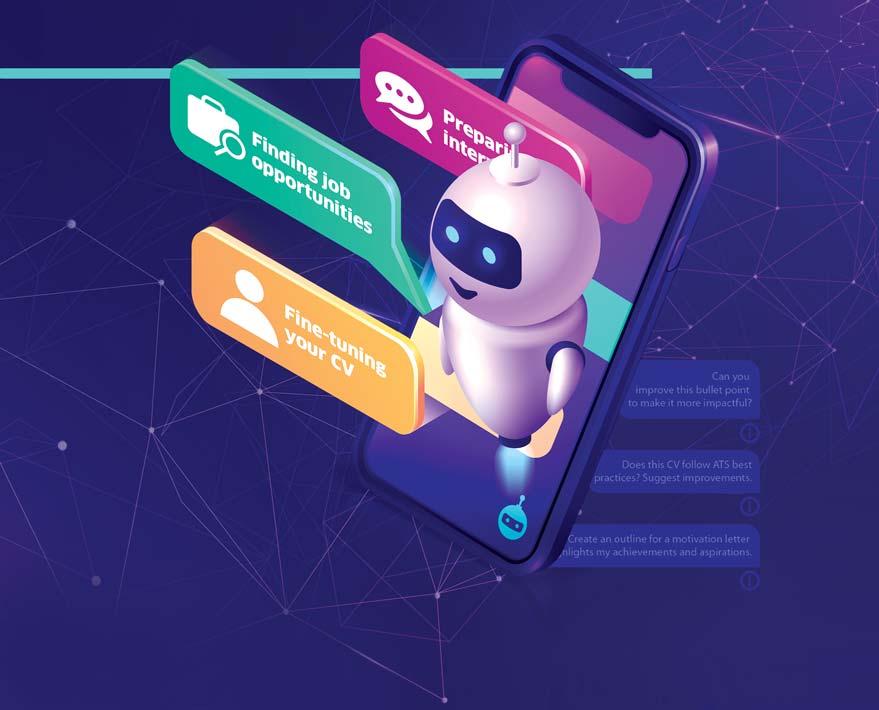
by Bridgetti Mashabane
THE JOB SEARCH PROCESS CAN OFTEN FEEL OVERWHELMING, especially for students navigating the challenges of creating a standout CV, identifying suitable job opportunities and preparing for interviews.
According to a survey by Resume Builder, nearly half of job seekers are now using Artificial Intelligence (AI) generative chatbot tools such as ChatGPT or Deepseek to assist with CV writing and crafting letters of motivation/cover letters. AI can simplify these tasks by providing instant feedback, streamlining repetitive processes and offering tailored suggestions that help your
application stand out. When used strategically, AI can save time, enhance the quality of your job applications and boost your confidence throughout your job search. However, like any tool, AI has its advantages and limitations.
AI can simplify tasks by providing instant feedback, streamlining repetitive processes and offering tailored suggestions that help your application stand out.
This article explores how you, as a student, can effectively use a generative AI chatbot (such as ChatGPT or Deepseek) to strengthen your job search strategy and improve your chances of success in today’s competitive job market. It also includes examples of effective prompts you can use to get the most out of these tools.
motivation can set candidates apart. AI can provide structure, refine language and enhance clarity.
DEVELOP A CLEAR STRUCTURE:
Ask the AI chatbot: “Create an outline for a motivation letter applying for [Scholarship/Internship] that highlights my achievements and aspirations.”
PERSONALISE CONTENT:
Request AI’s chatbot assistance: “Help me rewrite this paragraph to sound more engaging and enthusiastic.”
A well-structured CV and cover letter are crucial in making a strong first impression. AI can assist you in refining your job search documents by suggesting improvements in language, formatting and keyword optimisation to align with industry expectations:
ENHANCE CV BULLET POINTS:
Prompt the AI chatbot with: “Can you improve this bullet point to make it more impactful? e.g. managed social media accounts for a student organisation."
CUSTOMISE CV FOR A JOB:
Ask the AI chatbot: “Analyse this job description and suggest key skills or keywords I should include in my CV.”
ATS-FRIENDLY FORMATTING:
AI can ensure your CV is scannable by both machines and recruiters. Ask the AI chatbot: "Does this CV follow ATS best practices? Suggest improvements."
DRAFTING A STRONG LETTER OF MOTIVATION: For applications to scholarships, internships, or academic programs, a well-crafted letter of
CHECK FOR CLARITY AND PROFESSIONALISM:
Use the AI chatbot to refine the letter’s tone and coherence, ensuring it is both compelling and error-free.
AI can streamline the job search process by identifying relevant opportunities, suggesting alternative career paths and providing insights on industries:
EXPAND JOB SEARCH SCOPE:
Ask the AI chatbot: “What are alternative job titles for a [Desired Role] in [Industry]?”
Customise your Job Search Strategies: Request: “How can I effectively search for jobs in [Industry] with my background in [Field]?”
DISCOVER HIDDEN OPPORTUNITIES:
Seek AI guidance: “What are creative ways to find job openings that are not posted on traditional job boards in SA?”
Interviews can be nerve-wracking, but AI tools can help you practice responses, structure answers and build confidence:
PRACTICE COMMON QUESTIONS:
Request: “Generate common interview questions for a [Job Title] position.”
STRUCTURE RESPONSES EFFECTIVELY:
Ask the AI chatbot: “Help me craft a STAR method response for ‘Tell me about a time you faced a challenge.”
ENHANCE COMMUNICATION SKILLS:
Seek the AI chatbot’s feedback: “Evaluate my response for clarity, professionalism and confidence.”
INDUSTRY-SPECIFIC PREPARATION:
Ask the AI chatbot: "What case study questions might come up in a [company/sector] interview?”
A strong personal brand enhances job prospects by showcasing expertise and professionalism online. Over 80% of jobs are filled through networking. AI can help you craft an engaging LinkedIn profile, network strategically and create an impactful elevator pitch:
ENHANCE PROFESSIONAL SUMMARIES:
Prompt: “Write a compelling personal summary for my online profile that highlights my skills in [Industry].”
GENERATE NETWORKING MESSAGES:
Ask the AI chatbot: “How can I introduce myself to a professional in [Industry] and express interest in their work?”
CREATE ENGAGING CONTENT:
Request the AI chatbot to suggest: “What are trending topics in [Field] that I can write about to increase my visibility?”
Employers look for candidates who are continuously upskilling. AI can identify in-demand skills and suggest learning paths:
IDENTIFYING KEY SKILLS:
Prompt: “What are the most in-demand skills in [industry/field] for [year]?” or “Based on my background in [field], what complementary skills should I develop to enhance my career prospects?”
CREATING A LEARNING PLAN:
Request: “Can you create a 3-month learning plan for me to develop [specific skill]?”
FINDING RESOURCES & LEARNING METHODS:
Ask the AI chatbot: “What are the best online courses, books and free resources for learning [skill]?”
SETTING GOALS AND MEASURING PROGRESS:
Prompt: “Help me set SMART goals for learning [skill] over the next [timeframe].”
APPLY AND PRACTICE NEW SKILLS:
Request: “Suggest beginner-friendly projects to apply [skill] in real-world scenarios.”
AI is revolutionising the job search process, offering you an intelligent and efficient way to navigate applications, networking and career preparation. By integrating AI into your job search strategy, you can gain valuable insights, refine your communication and approach your career goals with confidence.
The key is to use AI as a guide and not as a replacement for genuine effort and personalisation. With strategic AI use, you can enhance your job search and unlock exciting career opportunities.
Being informed about industry salary trends and developing negotiation skills is crucial for securing fair compensation:
RESEARCH SALARY RANGES:
Ask: “What is the average salary for a [Job Title] with [X] years of experience in [Location]?”
PREPARE FOR NEGOTIATIONS:
Request: “How should I respond if an employer asks about my salary expectations?”
DEVELOP NEGOTIATION STRATEGIES:
Ask the AI chatbot for: “A script for negotiating a salary increase based on my skills and experience.”

by Bridgetti Mashabane
APPLYING FOR A JOB WITHOUT A CV MAY SEEM UNUSUAL, but many entry-level positions, internships, and part-time jobs require candidates to complete an online application form instead.
These forms help employers assess applicants based on structured information rather than reviewing a traditional CV and/or Letter of Motivation. To improve your chances of success, it’s essential to approach the application process with a strategic mindset and attention to detail.
10 things you need to keep in mind when filling out job application forms:
Before filling out the application form, take some time to research the company. Understanding the organisation’s mission, values and work culture can help you tailor your responses to align with what they are looking for in a candidate. Here’s how to do it effectively:
• Visit the company’s official website to learn about their services, products and values.
• Check their social media profiles and news articles for recent updates or achievements.
• Read job descriptions carefully to understand the required skills and responsibilities.
• Connect with company employees on LinkedIn, including UWC alumni, and engage with them to gain insight into the workplace culture.
By doing this research, you can provide more informed and relevant answers in your application, demonstrating genuine interest in the role and the company.
2
Take time to read the instructions thoroughly. Employers may specify certain requirements such as word limits, preferred formats or mandatory fields. Ignoring these details could lead to your application being overlooked. Pay close attention to:
• Whether specific documents or additional information are required.
• Word limit for responses to open-ended questions.
• How dates should be formatted (e.g. MM/DD/YYYY or DD/MM/YYYY).
Treat every online form as professionally as you would a CV or letter of motivation. The way you complete it reflects your commitment and attention to detail.
3
The first section of most application forms will ask for your basic personal details. Ensure that your:
• Full name is spelled correctly and matches official documents.
• Contact details (phone number and email address) are current and professional, avoid using casual or inappropriate email addresses. E.g. missexylicious@gmail.com.
• Address is up-to-date if requested.
• I.D. number is only provided if required.
4
Since a CV isn’t required, the application form will likely include a section for employment history. If you have previous work experience, ensure you:
• List jobs in reverse chronological order (most recent first).
• Include job titles, employer names, dates of employment and key responsibilities.
• Use action verbs like “assist,” “manage,” or “organise” to make your contributions stand out.
If you don’t have formal work experience, consider adding:
• Volunteer work.
• Extracurricular activities (e.g. student leadership/governance, event planning).
• Academic projects that demonstrate relevant skills.
5
You may not have direct work experience but can still highlight transferable/durable skills that apply to the position. These can include:
• Communication skills (e.g. writing, presenting, customer service).
• Leadership and teamwork experience from group projects, class representatives or clubs.
• Problem-solving skills demonstrated through coursework or personal initiatives.
Save copies of your application responses so you can refer back to them during interviews or future applications.
When filling out the skills section, some application forms may require you to explain how you’ve applied these abilities in real-life scenarios.
6
Employers value integrity and any inconsistencies or exaggerations on your application may be flagged during background checks. When listing qualifications, employment dates or responsibilities, ensure all details are accurate. Misrepresentation can damage your credibility and chances of securing the job.
7
Many application forms include short-answer questions like:
• “Why are you interested in this position?”
• “Describe a challenge you faced and how you overcame it.”
To write compelling responses, use the STAR method (Situation, Task, Action, Result):
• Situation: Briefly explain the context.
• Task: Outline your responsibility or goal.
• Action: Describe the steps you took to address the situation.
• Result: Share the outcome and what you learned.
For example, instead of saying, “I worked well in a team,” you could say:
“During a group project in my third year, we had difficulty coordinating tasks. I took the initiative to create a shared online task tracker, which improved communication and helped us complete the project on time with distinction.”
8
Some job applications ask for refereesthese are people who can vouch for your work and/or academic ethic and skills. Choose referees who:
• Are familiar with your academic or professional abilities (e.g. lecturers, previous employers or volunteer supervisors).
• Can provide positive and relevant insights about you.
• Are informed in advance so they can expect to be contacted.
Avoid listing family or friends as referees unless explicitly permitted by the employer or if they were your direct supervisor/ manager (e.g. working in a family business).
Spelling and grammar mistakes can create a negative impression. Before submitting your application:
• Proofread carefully for typos and clarity.
• Ensure information is accurate and formatted correctly.
• If possible, ask a friend, mentor or career advisor at your Career Services office to review it.
9 10
Once submitted, you may be called for an interview where you’ll be asked about your responses. Keeping a copy of your application allows you to:
• Review your answers before an interview.
• Stay consistent if follow-up questions arise.
• Re-use well written responses for future applications.
Filling out a job application without a CV requires careful attention to detail, honesty and a focus on relevant experiences and skills. By taking the time to write thorough responses and present yourself professionally, you increase your chances of making a strong impression on potential employers.
Remember, each application is an opportunity to showcase your potential, so approach it with confidence and preparation!
Give thoughtful, specific examples of your experience, rather than copying and pasting the same answer for every application.
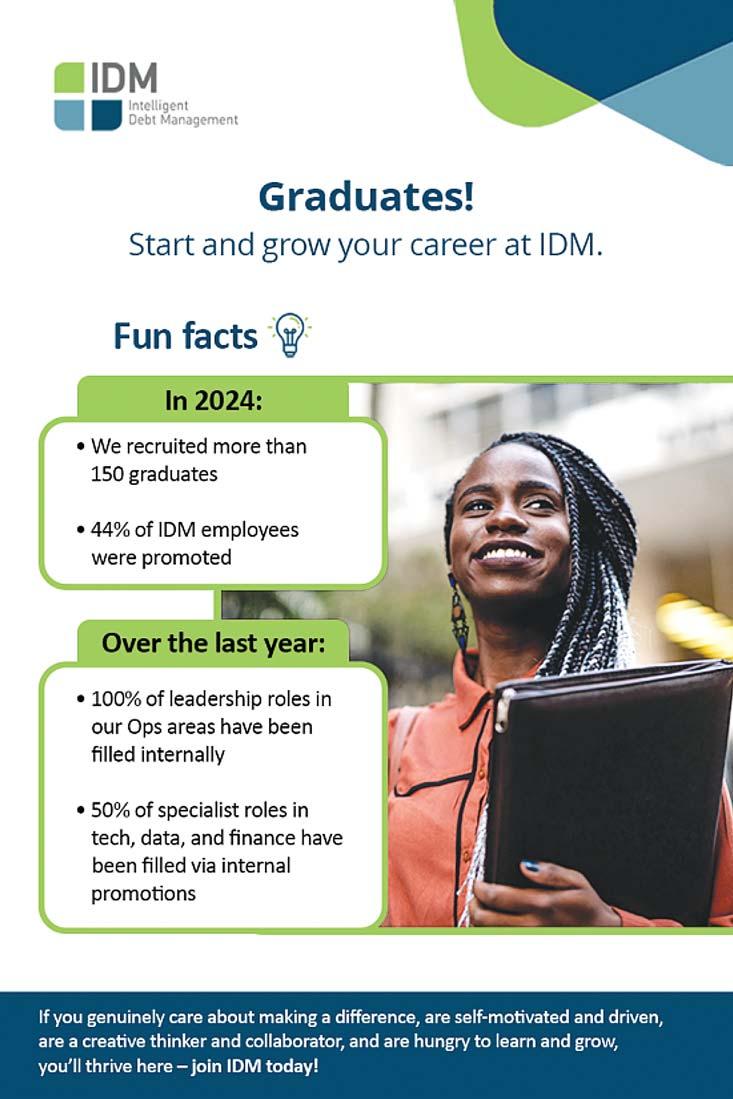
by Natalie Thomas
IN SOUTH AFRICA, A HIGHLY DIVERSE COUNTRY WITH 12 OFFICIAL LANGUAGES AND A RICH MOSAIC OF CULTURES, language serves more than just communication. It acts as a bridge, a tool and increasingly a key competitive advantage in the job market.
Many young professionals, especially students entering the workforce, often undervalue or downplay the significance of their home language in professional settings.
But what if your mother tongue could be one of your greatest assets?
From marketing to medicine, customer service to community work, language has the power to shape relationships, unlock opportunities and set you apart. Whether you speak isiXhosa, Afrikaans, Sesotho or any other South African language, your linguistic skills hold professional value and recognising this can be a game-changer for your career.
South African employers are placing increasing value on linguistic diversity in the workplace. The ability to communicate in more than one language enhances your adaptability, empathy and overall effectiveness as a professional. In any field of work, language often plays a crucial role in shaping the quality of interaction between service provider and client.
Consider a nursing student/graduate who is fluent in both Sesotho and English. In a clinical environment, being able to speak with a Sesotho-speaking patient in their mother tongue does more than offer comfort; it can lead to improved health outcomes. Similarly, a teacher who delivers lessons in isiZulu can help learners engage more meaningfully with the material and feel represented in the classroom.
These are not abstract concepts; they are part of the everyday South African reality, where language has a direct and measurable impact. In each scenario, the multilingual professional holds a clear advantage; not because their English is flawless but because they understand that real communication is rooted in genuine connection.
Language skills also position you as a connector and collaborator. In multilingual work environments, professionals who can shift between languages often take on the role of informal translators and team mediators to bridge the cultural gap. These contributions help to enhance teamwork, boost overall staff morale and strengthen client relationships.
Importantly, language proficiency goes beyond fluency alone; it also reflects cultural awareness. Recognising linguistic nuances enables you to navigate differences with empathy, professionalism and respect.
Mother tongue fluency holds significant value across various professional sectors. In fields such as marketing and media, creating content in indigenous languages enables access to diverse audiences. In customerfacing industries, engaging with clients in their preferred language fosters trust and enhances customer satisfaction.
Roles within government and public services frequently demand staff who can communicate effectively with citizens across linguistic and cultural lines. The same applies to researchers and fieldworkers collecting data in local communities, where trust, rapport and cultural understanding are essential to the success of their work. Ultimately, whether you're developing educational resources, creating multimedia content, selling products or delivering public services, the ability to communicate in more than one language can make your work more inclusive, impactful and relevant to the people you serve.
Your language abilities may well redefine your entire career path and give you access to overlooked opportunities such as careers in translation, content creation or teaching and learning. For those with an entrepreneurial mindset, consider offering tutoring or developing services in multiple
South African languages. These are all powerful ways to turn your language skills into professional opportunities. So, how can you showcase this superpower and make it work for you in your job search?
Be sure to include all the languages you are competent in on your CV. Wherever possible, connect your language skills to real-world experiences. For instance, one of our interns and a student assistant translated marketing content into their mother tongue, an excellent example of how language skills can add value in a professional setting. You can view their work on our YouTube page: “UWC Career Services.” These are the kinds of practical examples that highlight the relevance and impact of your abilities.
In your letter of motivation/cover letter and during interviews, confidently highlight how your language skills have helped you solve problems, build relationships or enhance service delivery. Don’t hesitate to showcase how being multilingual has shaped you into a more effective communicator, team member or leader.
The advantages of maintaining and developing your language skills extend well beyond your first job. Research shows that bilingualism can enhance cognitive functions such as memory, adaptability, and problem-solving. More significantly, staying connected to your mother tongue helps preserve your sense of identity, and it can offer grounding and resilience, particularly in high-pressure environments. As workplaces become increasingly inclusive and culturally diverse, the ability to navigate different languages and cultural contexts is
more valuable than ever. Demonstrating how you’ve used your mother tongue as a skill could distinguish you from other candidates in a competitive job market.
It’s time to reconsider what success sounds like. While English may dominate many formal and professional spaces, in a multilingual country like ours, your voice, exactly as it is, holds power and purpose. Whether you’re caring for a patient, building a brand or educating the next generation, doing so in your own language brings authenticity, trust and depth to your work.
So speak with confidence. In isiXhosa. In Afrikaans. In Sepedi. In Tshivenda. In whatever language is yours. Your language is not a barrier to be overcome; it is a strength to be celebrated. It is your superpower. Let your words, your own words, take you further.
CU
• Practice using your mother tongue in academic and professional settings.
• Look for job opportunities that mention “language skills” as a requirement or advantage.
• Refine your CV and letter of motivation/cover letter to reflect your multilingual capabilities.
• Explore courses in translation, content creation or language education to formalise your skills.
• Look out for opportunities that call for additional language speakers.
• As a student assistant or tutor, don’t be shy to suggest creating content in multiple languages.

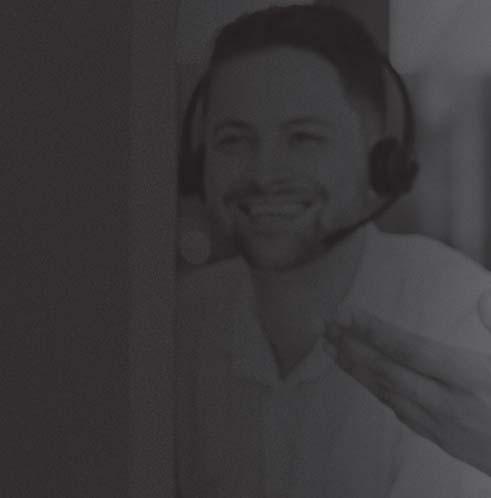
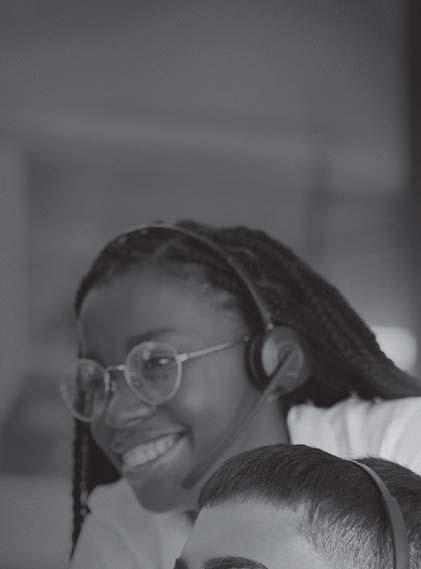
Invest in your career at Allan Gray.
Are you interested in joining our dynamic team at Allan Gray as an investment service consultant? In this role, you will engage directly with clients, helping them to navigate investment-related queries through various servicing channels. It is the perfect opportunity to apply your academic knowledge, passion for investments and strong communication skills in a real-world setting.





by The Centre for Entrepreneurship and Innovation
THE UWC CENTRE FOR ENTREPRENEURSHIP AND INNOVATION (CEI) exists to cultivate entrepreneurial thinking, action, and innovation across all faculties. CEI’s goal is to create opportunities for youth and township-based entrepreneurs by providing access to training, mentorship and innovation spaces. From students launching their first businesses to community members expanding township enterprises, CEI is at the heart of UWC’s commitment to real-world impact.
CEI is at the heart of UWC’s commitment to real-world impact.
Student Entrepreneurship
Equips UWC students with the skills, experience and networks to become entrepreneurial leaders. This includes flagship programmes such as STEP, UPBI, EESA, EDHE and ENACTUS, as well as student-led enterprises that create jobs and opportunities on and off campus.
Community Enterprise Development
Provides direct enterprise development support to township entrepreneurs and SMMEs through mentoring, training, coaching and strategic ecosystem partnerships.
Offers physical space, infrastructure and business support through initiatives like the UWC–Sanlam Trading Incubator and the CEI Innovation Hub in Parow. These hubs serve as springboards for entrepreneurs who need access to markets, networks and digital tools.
CEI empowers UWC students to become proactive and innovative entrepreneurs through experiential learning, exposure and community-based consulting. Here are some of our student entrepreneurship portfolios:
The STEP programme is a 12-week intervention designed to cultivate entrepreneurial thinking through hands-on business training. Since 2022, nearly 500 students have completed the programme. Delivered in partnership with Leuphana University and the German Commission for UNESCO, STEP also train student facilitators, equipping them to lead peer learning and expand the programme’s reach across campus.
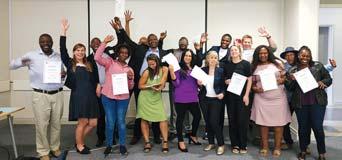
To support future entrepreneurial leaders, the CEI also hosts a 4-day Mastercard Foundation Scholarship Wrap-Around Support Programme at the Innovation Hub. The training combines Design Thinking and
the STEP approach, known for its hands-on, youth-centred and impact-driven model.
The UPBI trains UWC students to serve as consultants for township-based entrepreneurs using the internationally recognised 80 STEPS Framework. Launched in 2023 through a partnership with the Silulo Foundation and Notre Dame University.
Launched in 2025, SWEEP aims to support and empower women entrepreneurs at UWC. The programme provides a platform for young women to build businesses, network with industry professionals and access mentorship designed to strengthen their economic participation and leadership in entrepreneurship.
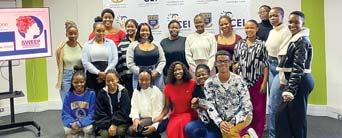
UWC’s Enactus team continues to make waves nationally and globally. In 2024, the team became National Champions with their projects LenoKids and Webmax, also winning the MTN Digital Transformation Award and the Harmony Entrepreneurship for Community Development Award. Representing South Africa at the Enactus World Cup in Astana, Kazakhstan, they ranked among the Top 16 teams globally. Currently, 28 student entrepreneurs are actively running 7 social enterprises, showcasing continued commitment to innovation and impact.
UWC is home to a dynamic group of student entrepreneurs who are building innovative and impactful businesses. These enterprises have emerged through participation in CEI programmes and continue to thrive with support in the form of mentorship, skills development and access to platforms that connect them with real-world markets.
Leno Kids (Pty) Ltd is an educational technology company that provides engaging and effective English learning experiences for children aged 5 to 13 (see the article in our 2024 publication).
Guideian (Pty) Ltd is a student-led academic support platform designed to help university students manage their academic workload and improve performance. It operates on a subscription model, providing access to structured academic resources, weekly planning systems, and mentorship via WhatsApp, TikTok and Instagram. Developed and maintained by a volunteer team, Guideian apply a data-driven approach using nine custom key performance indicators (KPIs) to measure user engagement, satisfaction, and educational outcomes.
Sanne’s Palace (Pty) Ltd is a Kasi-style food business founded by a UWC student. Located on campus and also listed on Uber Eats, Sanne’s Palace offers a fusion of South African street food with modern flavours, specialising in platters, kotas and gourmet burgers. The
CEI empowers UWC students to become proactive and innovative entrepreneurs.
business targets students and young professionals seeking quality, affordable meals with cultural flair. The venture currently employs four part-time student workers and one full-time staff member and is rapidly gaining popularity within the campus community and surrounding areas.
Webmax Solutions (Pty) Ltd is a fast-growing digital agency founded by two UWC students. The company specialises in web and mobile application development and currently serves over 70 small business clients. Webmax also runs a Coding Academy aimed at empowering high school learners and young professionals with practical tech skills, including web development and programming. The business has grown to include a team of full-time staff, 15 freelancers, and 18 commissioned sales agents (see the article in our 2024 publication).
These enterprises not only demonstrate the innovative potential of UWC students but also reflect CEI’s commitment to transforming education into economic opportunity. They serve as examples of what is possible when students are given the tools, mentorship, and space to grow their ideas into real businesses that make an impact.
The CEI’s community entrepreneurship projects aim to extend support beyond the university by equipping unemployed youth, graduates and township-based entrepreneurs with essential skills, mentorship and opportunities for business growth. These programmes are delivered through long-standing partnerships and are rooted in CEI’s commitment to inclusive economic development.
The flagship community entrepreneurship initiative addresses a critical gap in South Africa’s entrepreneurial landscape. FLMP tackles the widespread lack of business experience and foundational skills among many start-ups and youth-owned businesses. In 2024, FLMP successfully supported two cohorts through strategic partnerships with ABSA and Sanlam, and another Sanlam cohort commences in August 2025.
A registered trade association for employers in the building industry, partnered with CEI for nearly six years, to support emerging contractors and construction-focused entrepreneurs. The programme, delivered over six to eight months, focuses on building practical business capacity across five core areas: efficient project management, human resources and legal compliance, health and safety, contractual obligations and pricing and claims techniques. Participants, who specialise in areas such as plumbing, brickwork, plastering and waterproofing, are equipped with the knowledge to operate professionally and competitively in the construction sector.
CEI partnered with the Wholesale and Retail Sector Education and Training Authority in 2025 to deliver a focused community entrepreneurship programme aimed at empowering unemployed youth. It provides targeted training in entrepreneurship and business development. Participants gain practical tools to start and manage their own businesses or pursue self-employment opportunities.
The UWC Entrepreneurship Trading Hub/ Incubator, in partnership with Sanlam, officially opened its doors on 4 September 2024. Established to ignite entrepreneurial human capital, the Incubator seeks to level the playing field for all individuals to experience the empowering and transformative potential of entrepreneurship. This initiative presents a unique opportunity to address the challenges faced by township SMMEs, particularly their constrained and limited access to markets.
Since launch, the Incubator made significant strides in supporting and promoting entrepreneurs while strengthening the local entrepreneurial ecosystem. It received wide media coverage across News24, UWC Media and the Parliament website.
Two entrepreneurs achieved notable recognition at the Bellville Expo: Truth Gexa Designs won first prize, securing a mentorship and marketing support package valued at R60,000, while CorpChem placed third and received a package worth R20,000. The Incubator focuses on strengthening networks and creating market opportunities. Entrepreneurs participated in high-profile networking sessions, including Hirsch’s Morning Coffee and Treats event, and spoke at the Small Business Big Future Summit.
Tel: 021 959 1759
Email: cei@uwc.ac.za

by Siyolise Tsitsi
Software Tester at Vodacom | Coordinator of UWC Sport & Recreational Sporting Code| Former UWC Chairperson of Student Sports Council |Former UWC Sport Chairperson with 10+ Years in UWC Football | Former Enterprise Resource Planning (ERP) Analyst Intern at the City of Cape Town | Former Institutional Planning Intern at UWC (PYEI).
CAREER UPDATE (CU) FEATURED SIHLE MAPHUKATHA, a UWC alumnus who holds five qualifications and has completed two short courses through UWC. He has also completed a third short course from an external provider and is currently
enrolled in a fourth through UWC CoLab. He hopes to be known as a young man from a small village in Tsolo, who used education to overcome the odds.
Can you briefly share your motivations behind your educational journey?
I hold a degree in Environmental and Water Science and an Honours degree in Integrated Water Resource Management. Due to limited job opportunities in the field at the time, I pivoted into tech by enrolling in a Postgraduate Diploma in Software Development, which I completed alongside the EON Reality certificate through UWC
CoLab. Later, I pursued a Master’s degree in Development Studies. I then earned the International Software Testing Qualifications Board (ISTQB) certification through iLab Solutions, a private technology and quality assurance consultancy. I also completed an Agile Development certificate through UWC CoLab. My internship as an ERP Analyst at the City of Cape Town, where I first came to understand the value and relevance of short courses in the tech industry, further motivated me.
As someone coming from a science background rather than technology, these short courses were invaluable. I found short courses to be practical, focused and directly aligned with the work you do in the field. Unlike broader academic programmes, they bridge the gap between theory and real-world application. They’re also regularly updated to reflect current industry trends, which makes them valuable tools for staying relevant. Because of this, I’m currently enrolled in an Automation for Beginners certificate through UWC CoLab in collaboration with Coursera, as I’m interested in moving into automation-focused roles.
The Agile certificate, in particular, gave me practical, immediately applicable knowledge that my Postgraduate Diploma in Software Development didn't cover. Before taking the course, there were Agile-related questions I couldn't answer confidently; now I can handle any Agile-related discussion with ease. What really stood out was how practical these courses are; they prepare you to hit the ground running and are exactly what you need to adapt quickly in the workplace.
How did you fund your short courses, and were there affordable/free options you'd recommend to others?
My Agile certificate was funded by UWC Colab. My ISTQB certification was sponsored by iLab Solutions, a private tech and quality assurance consultancy. I’d also like to highlight that UWC offers access to a wide range of online courses through its partnership with Coursera. The platform includes both accredited and non-accredited courses across fields like IT and software development. Accredited courses are formally recognised by educational institutions, while nonaccredited ones are not officially recognised, but still hold value for personal development and career advancement.
How did the course(s) support your job search, employment and success at work?
The short courses played a huge role in helping me secure employment. After completing my Postgraduate Diploma in Software Development, I applied to a major bank I had always wanted to work for, but never received an interview. That changed once I completed two short courses, Agile Development and the EON Reality Certificates. That’s when I started being invited to interviews from a range of companies. I also found that employers in the Software and Quality Assurance (QA) industries often ask about ISTQB certification and include Agile-related
I applied to a major bank I had always wanted to work for, but never received an interview. That changed once I completed two short
courses.
I believe formal qualifications and short courses go hand in hand, degrees provide the theoretical foundation, but short courses make you job-ready.
questions during interviews. These certifications aren’t always mandatory, as I was once hired without ISTQB, but I had to complete it later on the job.
Their strong practical focus gave me a competitive advantage, especially compared to candidates who only had formal academic qualifications. While my Software Development Diploma included practical elements, the short courses were even more hands-on. That said, I believe formal qualifications and short courses go hand in hand, degrees provide the theoretical foundation, but short courses make you job-ready. They helped me build the confidence and skills I needed to perform well in my role.
Ultimately, how you market yourself is just as important as your qualifications. A degree or
short course alone isn’t enough; showing a willingness to learn is key to standing out and growing in the industry.
Were there any challenges in balancing short courses with job hunting or other commitments?
Definitely. Most short courses take place after hours and require discipline, dedication and effective time management to stay on track. Access to resources can also be a challenge, as many courses are online and require a reliable internet connection. In addition, a suitable device such as a laptop, desktop computer or smartphone is an essential tool that isn't always available to everyone.
What would you say is the biggest benefit of short courses, and what should graduates prioritise when selecting a course provider?
The biggest benefit is the real-world, practical exposure that helps you grow faster and stand out even among those with the same degree. Short courses prepare you for the practical side of the job. When selecting a course provider, graduates should first check the legitimacy of the course to avoid scams. It’s best to consult your institution for guidance; departments like UWC CoLab, Career Services or your relevant faculty can connect you with trusted providers. It’s also important to be clear about your area of interest before enrolling, as short courses are very focused. Don’t take one just for the sake of it; choose courses aligned with your field and career goals. In my experience, degrees provide essential theoretical knowledge, while short courses offer real-world skills. Both are important; degrees open doors, but short courses help you deliver once you are in.
CU
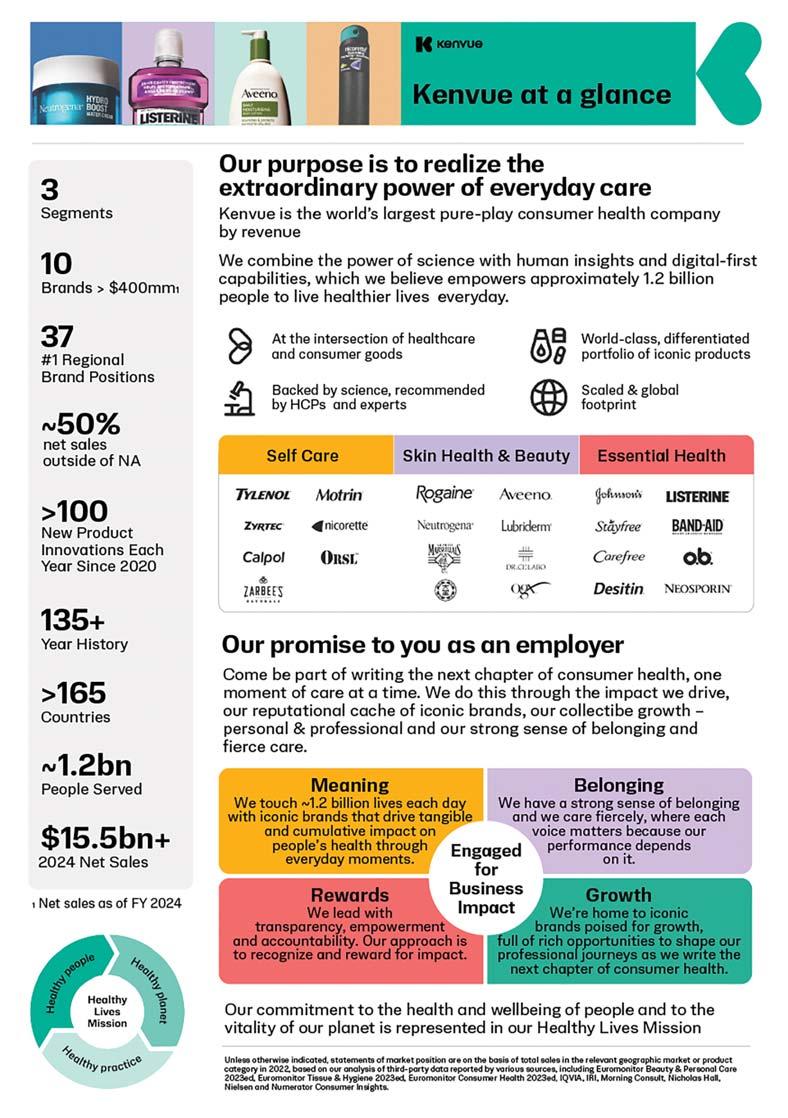
AS A GRADUATE OF THE UNIVERSITY OF THE WESTERN CAPE (UWC), you are part of a community that drives academic excellence, innovation, and social impact.
Here’s why joining and engaging with the UWC Alumni Community matters:
1
Your UWC degree represents achievement and purpose. By participating in the Alumni Association, you remain involved in the university’s ongoing growth and contribute to its continued success and reputation.
2
Gain access to a diverse community of professionals, mentors, and peers through alumni events, webinars, and online platforms. Staying involved can open doors to new opportunities, collaborations, and career insights.
3
Supporting UWC—whether through mentorship, volunteering, or donations to initiatives like the UWC Legacy Fund—helps ensure future students benefit from the same opportunities that shaped your journey.
4
Update your contact details to receive exclusive invitations, news, and opportunities. Email alumni@uwc.ac.za today to stay engaged with the UWC Alumni Association.









https://www.uwc.ac.za/campus-life/resources/career-services
